
2024 FIDI Conference inspires in Edinburgh


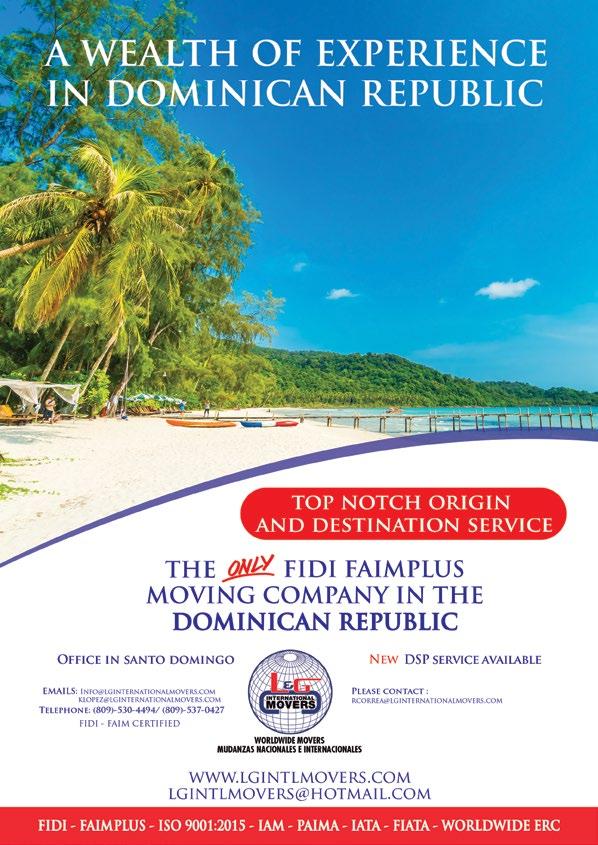
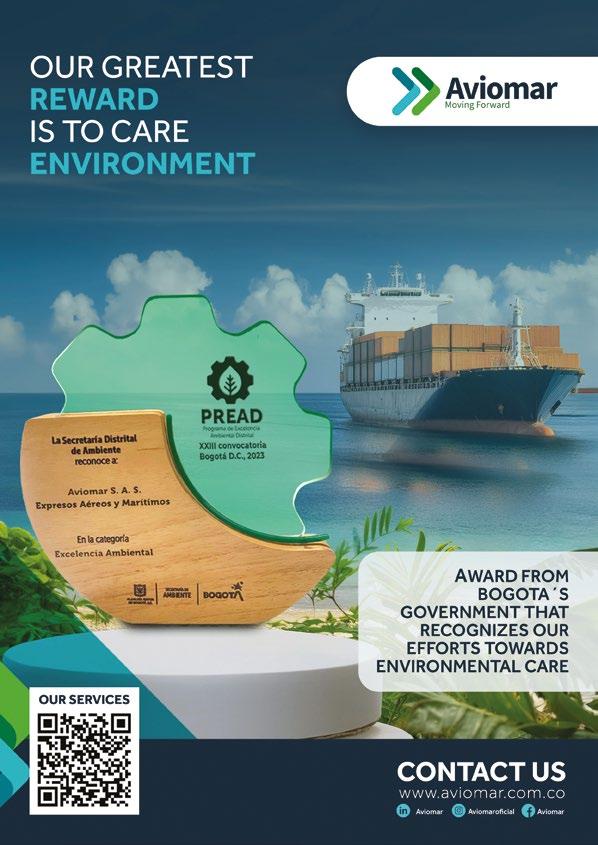



2024 FIDI Conference inspires in Edinburgh





Edinburgh, the location of choice for the 2024 Conference, is a city of firsts. It was the first city to have its own fire service, which was founded by James Braidwood 200 years ago this year. It was the home of Alexander Bell, inventor of the first telephone; and, in 1996, it was scientists at the University of Edinburgh who became the first to clone a mammal, Dolly the Sheep
For the first time in FIDI’s history, attendance at the conference needed to be capped, a clear indication of its enduring popularity among our membership. I found it rather fitting that the wonderful city of Edinburgh played host to my first FIDI Conference as your President.
From the fantastic welcome event at Edinburgh Castle, where FIDI Affiliates were given the run of the historic fortress for an evening, to the closing gala dinner at the National Museum of Scotland, it was an event that I was so proud to be involved with.
The whole week was steeped in Scottish culture. Following the bagpipe band into the conference hall for the official opening and roll call was one of the highlights for me and the other tartan-clad Board members – as Jesse said, ‘it made you feel like a rock star’. So was the visit to Gosford House and the chance to participate in traditional Highland games, including axe throwing, archery, and the sheaf and caber toss, which generated some friendly competition between Affiliates. Throughout the conference social programme, there were plenty of chances for people to sample Scottish food – many for their first time, too, including haggis and other local dishes, and a wide range of Scotch whiskey.
The formal side of the conference was also a
success. Attendees at the Delegates’ meeting praised how well organised it was, thanks to good preparation, and the business of the day was carried out smoothly as it should. This included the launch of another first, FIDI’s netting scheme, an initiative that promises significant benefits to our membership. The FIDI office has worked incredibly hard to bring this to the table, so I was really pleased to see how well received it was by our regional Associations.
Elsewhere, the business and workshop sessions provided forums for debating the topics that are affecting our industry. Having the opportunity to participate in many of the sessions, I was struck by the energy and positivity in every room I visited.
It was a fantastic first conference from my side; but what did other delegates, including the 24 per cent who were also first-timers, think?
Well, the post-conference survey was overwhelmingly positive, ratings averaging a maximum of five stars. Of everyone there in Edinburgh, an impressive 84 per cent indicated they plan to attend next year’s event in Dubrovnik, Croatia (with 15% still undecided).
The FIDI Conference is certainly a highlight of the year for many of us, me in included.
I am really looking forward to seeing many of you in Dubrovnik next year. It will be my first time visiting this historic city and will hopefully include even more first-time attendees.


10-18 NEWS
Including: 2024 State of the Industry report; ISS makes Bahrain purchase; Mesa acquires S&M Moving; Panama Canal transit numbers plummet
SPECIAL FEATURES
22-29 MENTAL HEALTH
Andrew Bennett on the stresses of being a moving company employee and a transferee
38 IMA AND YMC CONFERENCES
Lydia Cope reports from industry conferences in Vietnam and Spain
56-57 FIDI BOARD
Marcel Jörg speaks about future projects, including overseeing FIDI’s new netting scheme
70-71 THE INTERVIEW
Nizar al Mani, CEO of Four Winds Saudi Arabia, talks about the opportunities opening up due to the country’s ‘Vision 2030’ plan
REGIONAL FEATURES
30-34 VIETNAM
Despite regulatory obstacles, Vietnam’s moving industry is thriving thanks to economic growth and increasing openness
64 ROSEBROCK
Martin Sommer, of Wilhelm Rosebrock in Bremen, Germany, on why the company re-joined FIDI
40-55 2024 FIDI CONFERENCE
Highlights of the business sessions, social events, and networking at FIDI’s flagship event
58-59 FIDI 39 CLUB PRESIDENT
Jackie Stouffer on good strategies to attract and retain quality talent in the moving industry

60-61 FIDI 39 CLUB
Sonja Tuomela speaks to movers about how employers can care for the mental health of employees
62 EY: FINANCIAL HEALTH
Key findings and FIDI comment on EY’s annual independent financial assessment of Affiliates
66-68 FIDI ACADEMY TRAINERS
FIDI Academy keeps its team of trainers on top of the latest content with in-person events: we speak to attendees
19 AT A GLANCE
Statistics on Vietnam
76 PEOPLE MOVES
Lyons and Costa-Rising join Gerson; Acedo returns to Inters; Herbert in at JK; Harbison expands Grospiron role; Amorim to Invictus; Brytor leadership change
77 OBITUARY
Enrico Frigo
78 LIGHTER SIDE
McCarthy Red Cross honour; JK rewards driver of the year; Van Bockel’s cycling challenge; Dasey reaches 25 years at DB

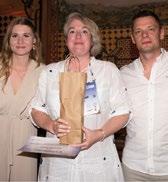
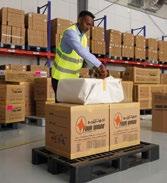





FIDI President Derek Duffy gives a president’s perspective on the 2024 FIDI Conference Page 5
FIDI Secretary General Jesse van Sas toasts a successful 2024 conference in Edinburgh –and looks forward to next year’s event in Dubrovnik Page 20
Global Mobility thought leader Stuart Jackson, reviews the conclusion that reducing HHG shipments doesn’t make mobility more sustainable Page 72
Jacob Dolan, of Reason Global, on why supply chain collaboration is essential to reducing the pressure of current global crises
Page 74
Editorial Editor: Dominic Weaver email: editor@fidifocus.org telephone: +44 7305 911 889
Advertising email: sales@fidifocus.org telephone: +44 1223 378 012
www.cplone.co.uk FIDI
Kingdom
+44 1223 378000

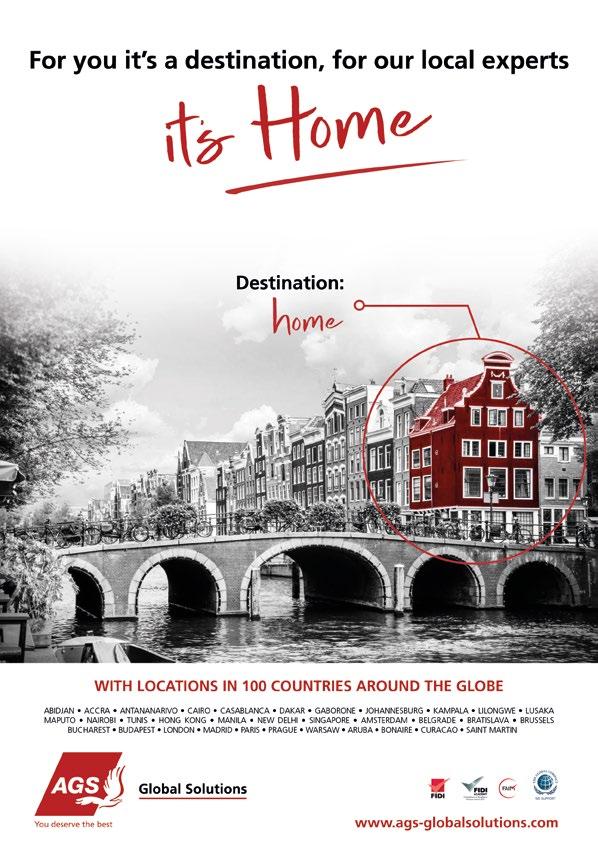

As you would expect, the 2024 FIDI Conference comprehensively took on the main themes currently impacting on the global mobility sector, from sustainability and digitalisation to recruitment and working in an increasingly volatile world. It also tackled mental health, one of the issues highlighted recently by the work of the FIDI 39 Club, who organised a conference session on this important topic.
This centred on the remarkable testimonial of Ben Schmidt – now of Gosselin – who spoke about the very real risks of burnout, which he experienced after working intensively for a long period. His compelling story serves not only as a cautionary tale about the dangers of overworking – in a society that pushes us to do so – but also highlights the power of brave, authentic stories in promoting understanding of mental health-related issues and bringing about progressive change in the way businesses regard them.
You can read more about Ben’s experience and what businesses can do and are doing to promote better wellbeing in our feature on pages 22-29.
The conference business sessions, workshops, networking, and social events illustrated that the
spirit of debate amongst Affiliates is healthy, too. In a world where geopolitical, competitive, and financial pressures are all rising, FIDI provides multiple forums for discussing the sector with peers and help each other find mutually beneficial solutions. To get a feel for this, I’d recommend you watch the conference sessions, which are now available on FIDI’s YouTube channel.
With a huge number of delegates at the Edinburgh event, the conference appears to be in fine health, too. Of course, it needs to be supplemented with virtual meetings, and FIDI has pledged to make its flagship event more sustainable, but the appetite for an in-person conference is growing rather than waning. Planning is well under way for Dubrovnik next year, with the following two years being sketched out, too.
Aside from the conference, EY’s latest financial assessment of FIDI Affiliates provides some tangibles on the moving industry. This annual report gives a generally positive write-up of the industry’s health. However, there remain attention points for many to improve their health further still.
DOMINIC WEAVER Editor, FIDI Focus
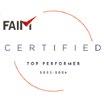
The 2024 FIDI Conference took place in Edinburgh between 12-15 May, attracting a capacity attendance of 650 delegates from around the world – the largest number for at least 10 years. With sustainability as one of its key themes, the event featured a keynote presentation from author and environmental-transition expert Lucas
Simons, sustainability workshops, and headline initiatives including a sustainable travel drive fronted by the FIDI 39 Club, limiting printed material and giveaways, and a ‘Meatless Monday’ lunch.
At recent events, FIDI has made changes including switching to recycled and recyclable cardboard for


its badges, stopping free conference bags and other giveaways, and making reusable water bottles available for Affiliates.
Insurance broker Reason Global was the Sustainability Sponsor of the 2024 FIDI Conference.
For full coverage of the conference, see pages 40-55.

FIDI has launched a carbon calculator for the relocation industry.
The organisation joined forces with global sustainability platform Worldfavor to design the tool, which is available online to FIDI Affiliates.
FIDI said: ‘Faced with an increasing pressure from corporate clients, RMCs and legislation, companies in the international relocation industry – including FIDI members – have to solve the complex challenge of measuring and reporting on their company’s carbon footprint. To help FIDI Affiliates with this task, FIDI teamed up with Worldfavor to develop a calculation tool that is adapted to the specific needs of our relocation industry.’
The partnership allows FIDI members to create a free Worldfavor account, giving them access to:
1. A bespoke FIDI and Worldfavor carbon calculation tool, developed to cover the specific needs of moving and relocation companies
2. A reporting solution for each company’s carbon footprint
3. An extensive knowledge hub with a wide range of educational tools and assets.
Access to the calculation platform is free of charge for FIDI-affiliated companies, who can go to FIDINET to create a Worldfavor account.









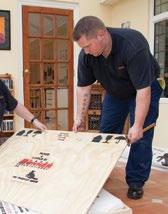







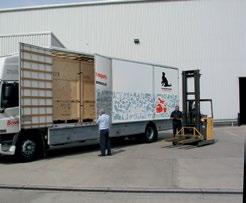

From whole house contents to cars, single items or pieces of art, no one is more careful than Doree Bonner International. We’ve been moving our customers’ possessions around the world for over 90 years - providing the highest standards of service at sensible prices.
For a free origin survey or destination rate, email us and get your clients move off to the ‘Purr-fect’ start. email: imports@dbonner.co.uk website: www.doreebonner.co.uk



John Mason International has been awarded the King’s Award for Enterprise in recognition of its outstanding service in international trade and dedication to excellence in global relocation services.
Representatives of the Liverpoolbased firm, which celebrates its 140th anniversary this year, will visit Windsor Castle to accept the award from King Charles III later this year.
Simon Hood took over the family company as owner and executive director in 2021 after a management buy-out. He has led the company through a significant period of expansion. Turnover increased from £6.6m in 2020 to £13.5m in 2022, and overseas sales rose from £5.6m to £12.3m.
Hood said: ‘We are profoundly honoured to receive such esteemed recognition for our work in the international moving sector. This King’s Award for Enterprise is not only a recognition of our historic legacy and our innovative approach to relocation services but also our team’s unwavering commitment to excellence.’
FIDI Focus has launched its 2024 State of the Industry report.
Featuring interviews with spokespeople from across the moving and relocation industry, the annual publication looks at major trends impacting the global mobility sector. These include: economic and geopolitical factors; the rise of lump sum and other alternative packages; sustainability; the recruitment crisis; technological disruption; and economic and geopolitical factors.
The 2024 State of the Industry report is available to download as a PDF from FIDI at www.fidi.org/2023/24-stateindustry-report-fidi-focus















FIDI Focus State of the Industry report 2024





Sea freight rates have risen sharply towards similar levels to those at the end of the pandemic, according to industry reports.
The spike has been caused by unexpectedly high demand for services – 9.2 per cent in Quarter 1 2024 compared with the same period the previous year, according to analytics platform Xeneta –coupled with geopolitical disruption, particularly the threat of Houthi attacks in the Red Sea, which have caused lengthy vessel diversions around the Cape of Good Hope.
This has caused pressure on availability for shippers and pushed the price of a container to the US$10,000 mark, first reached during the COVID-19 pandemic on an Asia-Europe route. It has also increased the number of empty shipping legs taking place.
The sea freight sector has experienced significant volatility during the past four years, triggered by lockdowns that were followed by a surge in Western customers buying imported goods.


Dubai-headquartered ISS Relocations has announced the acquisition of the relocation arm of Ahmadi Cargo and Packing, as part of plans to expand its operations in Bahrain.
An ISS statement said the move was ‘a next step of our progression in the region, to solidify our presence
and achieve our long-term vision by a strategic decision to expand our market share in Bahrain’.
Formed in 2001, the business, known locally as Ahmadi Packaging and Forwarding, has worked with local businesses, agents, and corporate clients for more than two decades.
The US Federal Maritime Commission (FMC) has announced its final ruling on demurrage and detention billing. The regulation is based on proposals published in October last year, with changes, and came into force on May 28, 2024.
The International Federation of Freight Forwarders (FIATA) said it welcomed FMC’s investigations into substantial increases in demurrage and detention practices and highlighting the need for clarity regarding the content of the increased charges.
FIATA said in a statement: ‘The FMC final rule on demurrage and detention billing practices sets forth comprehensive guidelines aimed at ensuring transparency and fairness
in billing procedures and dispute resolution regarding demurrage and detention charges, in line with the inputs provided by FIATA in the course of the rule-making process. Notable provisions within the document include the requirement for common carriers and marine terminal operators to add specific and identifiable information on their demurrage and detention invoices, facilitating clearer understanding for billed parties regarding the nature of charges incurred.’
It went on: ‘FIATA encourages its worldwide membership to embrace the FMC final rule as a benchmark for best practices, promoting greater certainty and a level playing field across the supply chain.’
Suddath has announced it has brought its portfolio of global residential moving and storage services under a single business unit.
The division will be fronted by Walter Myers as President of Suddath Moving & Storage, who the company said ‘brings considerable experience and expertise in operations, strategic planning, business development, partnership management, procurement, and finance to his role’.
In its 2024 Partner Update and Contact Information guide, the company highlighted its ongoing commitment to getting 10 out of 10 service delivery scores for every shipment.
The operations of Asian Tigers Taiwan continued to run despite the country being hit by a 7.2 magnitude earthquake in the early hours of April 3.
At least 25 deaths and 800 injuries were reported on the island as a result, as well as landslides, damage to buildings, roads and public transport networks, especially along the country’s east coast.
The earthquake struck off the coast of Hualien City and was the largest the country has seen in the past 25 years.
Not-for-profit trade consortium Global Shipping Business Network (GSBN) has joined forces with Mediterranean Shipping Company (MSC) on an initiative it says will boost the safety of transporting shipments containing lithium batteries.
The venture allows safe transportation certification to be shared directly by testing laboratories over GSBN’s blockchain network and accessed during booking by MSC. GSBN said the system is ‘replacing an often paper-based process in which such certificates are hard to verify and carried risks such as loss, mislabelling as well as fraud’.
The quantity of lithium-ion batteries in container ships cargoes is increasing, along with the number of misdeclarations, and the shipping industry has cited the risk of dangerous fires on ships as a major concern.
GSBN and MSC announced the venture during the 78th CDC and plenary meeting of SMDG, a user group for electronic data interchange (EDI) in the maritime container business, which was held in Antwerp, Belgium.
GSBN has extensive access to leading testing laboratories and certification providers in China, including SICIT and Pony Testing. The company added that it aims to extend its partnership with MSC to include further certification and to expand the network of laboratories to increase coverage for carriers.

Mesa Moving and Storage has acquired S&M Moving Systems North, which has now been rebranded as S&M Moving and Logistics
Based in Fremont, California, S&M has been in the moving and storage business since 1918, building a strong reputation across the UniGroup network and beyond. It said in a statement that the deal brings synergies to the two companies, expanding Mesa’s capacity.
‘Adding S&M and its talented team of professionals, led by industry veteran Mike
Dahl, will allow Mesa to continue to offer a diverse menu of relocation and logistics services, and expand our footprint while sharing a common goal of providing the highest level of service and care,’ it said.
Mesa Moving & Storage was founded in 1981 in Grand Junction, Colorado. The company has expanded to cover eight locations throughout Mountain West and California. It is a leading agent for United Van Lines, with more than 500 partners across the US.
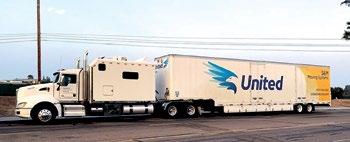
Graebel has introduced a new tool to boost the transferee experience of Core-Flex programmes. The Graebel Mobility Experience (MX) Coach, it says, has been designed to create a ‘peoplefirst experience’ that meets employee needs, and company and talent mobility programme goals, too.
The company said: ‘Core-Flex programmes have evolved over the past few years, driven by mobile employees’ desire for flexibility and choice, and employers’ insistence on relocation benefit cost controls. With Core-Flex programmes comes the need for employees to make many relocation benefits choices from a variety of options – choices that will have a major impact on the success of the relocation and their satisfaction with the experience.’
The MX Coach is integrated into Graebel’s globalCONNECT platform. It ‘starts with the end in mind’ said the
company, ‘ensuring mobile employees feel good about their relocation experience because they were informed and prepared to make smart relocation decisions’. The tool lets employees select benefits from a menu of options tailored to their own relocation needs and preferences, ‘creating a customisable experience that helps mobile employees make the right decisions for their lifestyles and circumstances’.
‘We’ve put our people-first approach at the heart of the MX Coach experience. With Graebel, mobile employees not only get from A to B, but enjoy the journey every step of the way because we’re helping them choose their relocation benefits with confidence,’ said Matt Brownlee, Chief Operating Officer of Graebel Companies, Inc. ‘We believe that Core-Flex benefits selection shouldn’t just be about the technology – it’s about creating a holistic, people-first journey, supported by great technology.’


The number of containers arriving at US ports has remained buoyant, despite disruptions in the Red Sea/Suez region and the Panama Canal.
According to a report by The Maritime Executive, the daily average number of containers arriving in the US, rose by six per cent during January to 65,000 TEU a day on the previous month, with February reportedly strong, too.
Analysts at logistics software provider Descartes said year-on-year volume growth was approximately 13 per cent. Total US import volumes were 2.14m TEU in February, up 19.5 per cent on February 2019.
Shippers were forced to make further adjustments to schedules as the result of a vessel’s collision with the Francis Scott Key Bridge in Baltimore on 26 March.
Carrier CMA CGM reportedly issued a Force Majeure notice following the Baltimore incident, having done the same in December 2023 in response to the worsening situation in the Red Sea. The firm said the rerouting of containers – to nearby ports such as Norfolk or New York – would be done at the shipper’s expense.
Two temporary routes, bypassing debris caused by the Dali vessel incident, were opened, allowing limited traffic into the Port of Baltimore.
Operators including MSC said the additional disruption could take months to ease.
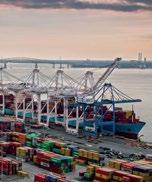
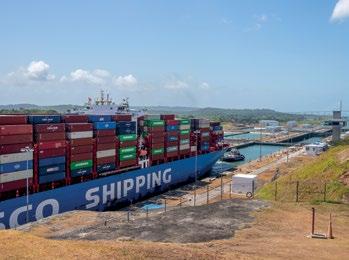
Ongoing disruption has caused traffic in two of the world’s major shipping routes to fall significantly, according to a new United Nations Conference on Trade & Development report.
The report states that attacks on ships around the Red Sea and Suez Canal by Houthi rebels, coupled with ongoing restrictions caused by a drought impacting on drafts in the Panama Canal, have caused transit in the two waterways to fall by 42 per cent and 49 per cent compared with their peak times last year.
Shipping lines are diverting vessels away from the Suez Canal around the Cape of Good Hope, with 586 ships having taken the alternative route by the second week in February. This has added significant fuel costs and the loss of some time-sensitive cargo.
The report said if all container vessels using the Suez Canal on a Far East/Middle
East/Indian subcontinent and Europe route (both directions) were diverted, it would increase global container TEU-miles by 10 per cent.
Insurance premiums for vessels passing through regions affected by conflict have reportedly increased, with one source citing a 900 per cent rise for some shippers.
The report said it is the first time the world has faced ‘simultaneous disruptions in two major maritime waterways’ and that this had ‘far-reaching implications for inflation and food and energy security’.
From late March, the Panama Canal Authority introduced measures to ease the restriction, including increasing daily availability by 12 per cent. According to the authority, the industry has adapted to the restrictions, with some vessels using a reservation system, some transhipping, and others diverting to alternative, longer routes
The Federal Maritime Commission (FMC) has finalised compromise agreements with three companies, collecting more than US$2.3 million in civil penalties and securing commitments to reform specific business practices.
CMA CGM, an ocean carrier, paid $1,975,000 to resolve allegations of improperly billing third parties by overbroadly defining ‘merchant’ in its bills of lading. As a result, the company has stopped
this practice and changed its tariff rules.
Vanguard Logistics Services, an ocean transportation intermediary, paid $175,000 for accepting cargo from OTIs without bonds, insurance, or other legal requirements. It has agreed to audit its practices and report quarterly to the FMC on remedial actions.
Shipco Transport, Inc. (Shipco), an OTI, paid $155,000 to resolve three allegations of misconduct.


The US Federal Trade Commission (FTC) has issued a final rule on business impersonation. Prohibited actions include:
● Using government seals or business logos in communications
● Creating spoof government and business emails and web addresses
● Falsely implying government or business affiliation.
The rule aims to combat scamming, particularly around events like the IAM Annual Meeting. Violators will face monetary penalties sought by the FTC in federal court.
The new rules came into effect on April 1, 2024.
Indian mover Globe Moving has launched an AI chatbot on its website to enhance customer support.
The multilingual chatbot, capable of interacting through written and audio inputs, uses advanced natural language processing and machine learning to address FAQs about packing and moving household, pet, and office goods.
The chatbot is continuously available and ensures customers can access reliable information at any time, improving the user experience and streamlining the moving process.
The COSCO Shipping Aries was the first 20,000 TEU vessel to enter the Port of Genoa earlier this year. The vessel will now regularly service Italy’s largest port on its Asia-Mediterranean route. After its maiden voyage in 2018, the vessel also became first of its class from China to dock at Hamburg’s HHLA Container Terminal Tollerort.
City authorities in Paris have released an interactive map to aid moving companies during the summer Olympic Games. AGS Paris noted that moves during the event might need to be completed in multiple stages or require additional resources due to traffic and security restrictions.
This year’s OMNI conference took place at the Carton House Hotel near Dublin, which has been a retreat for the royal and famous for centuries.
The event, for top management of some of the most influential companies in the industry, featured strategic discussions around topics including sustainability, economics and European trading opportunities.
Sessions included one with Johannes de Kam, the academic who has been hosting the OMNI World Series of workshops on sustainability, who presented with Paul Barnes of Inspire
Global Mobility Consulting, to look at the way forward for sustainability in the industry. He also hosted a follow-up session specifically aimed at the use of sustainable materials, which included contributions from relative newcomers Voerman’s Lars Bakker and Gosselin’s Madeline van der Rhee.
The keynote speaker was David McWilliams, an Irish economist, writer and broadcaster, who gave an alternative view of the drivers that create economic trends and how, individually, we can all influence them.

OMNI’s World Series of educational webinars continued with a session on business ethics.
The event was introduced by OMNI President Philippa Robinson (Robinsons Relocation, UK). Guest panellists were Pauline Collins (Voerman, the Netherlands), Sara Lyrum Kronkjaer (Aspire Mobility, Denmark) and Andy Cummins (Alfa Mobility, Sweden). The webinar was moderated by Steve Jordan, editor of The Mover Jordan opened with a simple question: ‘Is it ever acceptable to impose terms on a supplier that you would not be prepared to accept yourself?’ This stimulated much discussion but came to the realistic conclusion that it was not. Why then do so many companies appear to do that and what should the reaction be from suppliers who feel somewhat helpless when in the shadow of powerful customers? That was a much
more difficult question to answer.
Slow payment was debated with the question: ‘Do some firms purposely create obstacles to delay payments such as rejecting invoices for trivialities?’
The meeting also spent some time discussing the original issue of intimidation of people by those who perceive themselves to be more powerful. Is the problem getting worse? To what extent is management to blame? Do cultural differences make this behaviour more acceptable in some countries? What should anyone do if they witness this kind of behaviour?
There were many suggestions, but perhaps the most important decision was the determination voiced to expose the wrongdoing and work to educate the market that treating people badly is unfair, immoral and, ultimately, bad for business.
35 years since Vietnam opened to foreign investment
half the standard VAT rate for certain sectors
5.66% Vietnam’s GDP growth in the first quarter of 2024
70% share of Vietnam’s withpopulationinternet access (from almost zero 20 years ago)


FIDI Secretary General Jesse van Sas celebrates the successes of the 2024 conference in Edinburgh – and looks forward to building on these at next year’s event in Dubrovnik
s we came to the afterglow of our 2024 FIDI Conference, looking at survey results, debriefing with suppliers, tallying up the figures, and matching budget with actuals, a few things came to my mind when reflecting on our gathering in the beautiful city of Edinburgh.
Judging by the comments, the conference was a hit, with a score of 4.7 out of 5. Of course, the city itself played an important and positive role in this, not to mention the weather, which was miraculously cooperative at the times when we needed it to be.
What I was really pleased about, however, were the many comments we received from delegates that FIDI has the right balance between true networking, content, venue, and entertainment. This is what our conference is all about: meeting your peers in a relaxed atmosphere, away from the daily business, allowing meaningful conversations on the challenges and opportunities we face in the industry today, learning about new trends, and forging lasting relationships.
An increasing number of our attendees are turning away from the one-to-one meetings in lobbies or stuffy meeting rooms. They have decided, instead, to listen in on keynotes, panels, and informative workshops, and to use the receptions, lunches and dinners to mingle with other attendees, who are often unknown to them.
No less than 93 per cent of attendees stated that the conference had helped them to grow their network, which is exactly the purpose of it all. The keynote speech by sustainability expert Lucas Simons was attended by 38 per cent of conference delegates, which is one of the best results in recent years, and just more than 50 per cent attended at least one business session.
This is great – but it means we still have a way to go, as the other half did not attend any business session. We’ll keep working on providing valuable topics for these conference slots, and we are always grateful for your suggestions.
I have to admit that some of the comments received in the survey made me smile –particularly the suggestion that we should have looked for a bigger conference hotel! (Why did we not think of that?)
It does remind me that, no matter how often we communicate, the message often still gets lost along the way. From an organisational standpoint, Edinburgh was a challenge. The city’s largest hotel, our conference hotel, was still not big enough, and combined with more attendees than expected, this gave us some extra grey hairs.
We could count on satellite hotels in the area, and while many of you appreciated the short walk, this was not ideal. At FIDI, we always strive for one hotel for all, preferably downtown. In some cities, however, this is just not possible. Then we have to make the best of it, and communicate about it well in advance, multiple times.
Some of you were disappointed at being given a handout on paper for one excursion, feeling that this was less sustainable. I get this, but please note that, compared with Amsterdam in 2019, the Edinburgh conference was 95 per cent more sustainable in terms of printed materials and conference shipment. If we print anything, it is done locally and only if really needed.
This means we have done away with attendee booklets, printed programmes, conference bags and giveaways, as well as single-use roll-up banners. The conference app, used by 86 per cent of you, helped greatly in replacing all of this formerly printed material.
Overall, the carbon impact of the FIDI Conference has changed dramatically in recent years. We will continue on this road to an even more sustainable event in 2025.
We are encouraged by your appreciation of the efforts made by FIDI staff and the events team for our annual conference, and are happy to see that, as FIDI Focus went to press, 85 per cent of you have decided to attend Dubrovnik next year. Now, we just need to find a hotel that’s big enough …





















With 23.1 per cent of US adults experiencing a mental health condition in 2022, according to the country’s Substance Abuse and Mental Health Services Administration, mental health and wellbeing is a topic firmly on the business agenda. The process of moving – and being moved – can put a considerable strain on moving company employees and transferees relocating abroad. So, can the industry do more to help its workforce? Andrew Bennett investigates

Moving is said to be one of the most stressful experiences in a person’s life, partly because it is the only occasion when people have strangers coming into their home, touching and moving their personal effects and working up close in their personal space and that of their family.
For this reason, when problems occur, the moving experience can become a powder keg, sparking intense emotional reactions. Transferees and their families can become seriously stressed, while moving crews and other employees can be on the receiving end of the fallout.
‘You will absolutely get yelled at in this line of work. It can be pretty nasty depending on what is going on,’ says FIDI 39 Club President Jackie Stouffer, who is VP International for global move management at JK Moving Services in the US.
‘If you are an emotional person, you will take that (bad experience) home with you, and it will stay with you for a while.’
Talent Management Professional and Mental Wellness Coach Christina Kasiraja-Lebrun, who has worked with the moving industry, says: ‘Exposure to traumatic events or distressing circumstances in certain professions – such as healthcare, emergency services, or humanitarian aid work – can take a significant toll on mental health. I personally think the global mobility industry should be included in this list, but because the general population tends not to know about the existence of this industry, its importance is overlooked.’
In any industry where employees often work long hours around various time zones, meeting the needs of demanding clients, burnout is a real possibility (see Ben’s story, p28).
While there are no figures specific to the moving and relocation industries, the World Health Organization (WHO) has recently acknowledged the seriousness of mental health as an issue. In the World Mental Health Report 2022, WHO Director General Dr Tedros Adhanom Ghebreyesus singles out COVID-19 for ‘the huge toll it has taken on people’s mental health’.
According to the WHO, rates of common conditions, such as depression and anxiety, increased by more than 25 per cent in the first year of the pandemic, adding to the nearly one billion people who were already living with a mental disorder.
Moving company employees – and the transferees they serve – have also faced stress from recent upheaval in the global supply chain, with delays from shipping lines, at customs and in ports, and a global shortage of shipping containers. Not to mention the everyday pressures of this business.
Stouffer – who, along with FIDI 39 Club colleagues, is pleased that mental health now has a higher profile – identifies another issue: ‘Today, people have technology at their fingertips, so they think: “I need an update right away”. That is not something


“Your body gives you signals, but you just try to ignore them”


we had to this degree five or 10 years ago. That shift has definitely played a part in increasing the pressure on employees.’
Likewise, the influence of online retailers, such as Amazon – which promise fast delivery and updates in real time – has raised clients’ expectations, says Sonja Tuomela, a FIDI 39 Club Board member and Sales and Operations Manager at Travelcargo in Finland.
‘On a regular basis, I get clients who are quite surprised how long the transit times are,’ she says.
‘I’m sure (online retail) has had quite a big effect when you can order something and it arrives in a couple of days... and customers are told (the transit) can take perhaps two and a half months.’
Kasiraja-Lebrun advises employees to become resilient to deal with modern demands. ‘Heightened expectations can put added pressure on employees to deliver exceptional service consistently,’ she says.
‘Employees may face challenges in meeting these expectations, particularly in situations involving complex issues or emotional interactions. Moreover, the impact of social media amplifies both positive and negative experiences, increasing the scrutiny on employee performance.’
What should help reduce stress and, therefore, improve mental wellbeing for moving company employees – and the assignees they are helping – is setting clear expectations.
Kay Kutt, CEO of relocation company Silk Relo, says: ‘It is so important to manage expectations and clearly communicate what to expect for the transferee and their family before they relocate.
‘Ideally, keep that education and communication open while they relocate, after they arrive and, for those that receive ongoing support, while they are on assignment.’
With less stigma attached to mental health now than there once was, employees who find themselves stressed should be able to access a variety of global resources to support their mental health, wellbeing, and work-life balance.
‘Online platforms such as mental health apps, virtual support groups, and educational websites offer resources and tools for managing stress, anxiety, and other mental health concerns,’ says Kasiraja-Lebrun.
Non-profit organisations and advocacy groups also provide information, helplines and referrals



to mental health services and support networks.
Kasiraja-Lebrun says: ‘Additionally, individuals can seek out community resources such as counselling centres, community mental health clinics, and support groups offered by local organisations.
‘Some employers offer Employee Assistance Programmes that provide confidential counselling, referrals and resources for employees and their families.
‘To maintain a good work-life balance, you may prioritise self-care practices such as exercise, mindfulness, and hobbies outside of work. Setting boundaries, both physical and digital, can help prevent burnout and create space for relaxation and personal fulfilment. Effective time-management strategies, such as prioritising tasks and delegating, when possible, will help achieve a healthy balance between work and personal life.
‘Regular communication with supervisors about workload and expectations can ensure realistic work arrangements that support wellbeing.’ Ultimately,
it’s important to seek support when needed and ‘prioritising self-care is essential for maintaining mental health and work-life balance’, she adds.
FIDI 39 Club’s Tuomela says maintaining wellbeing and mental health for employees is important for retaining talent in moving companies – and the issue is becoming increasingly important for the younger generation of movers.
‘There is a gaping difference between mindsets generationally – Generation Z really want a work/life balance and will not sacrifice their mental health, which may be hard for managers to understand,’ adds Stouffer.
The FIDI 39 Club has been focusing on this topic at online events for its members and its overall aim is to make people in industry comfortable talking about mental health.
‘The more people that share their experiences... the more acceptable it is to do this,’ says Stouffer.
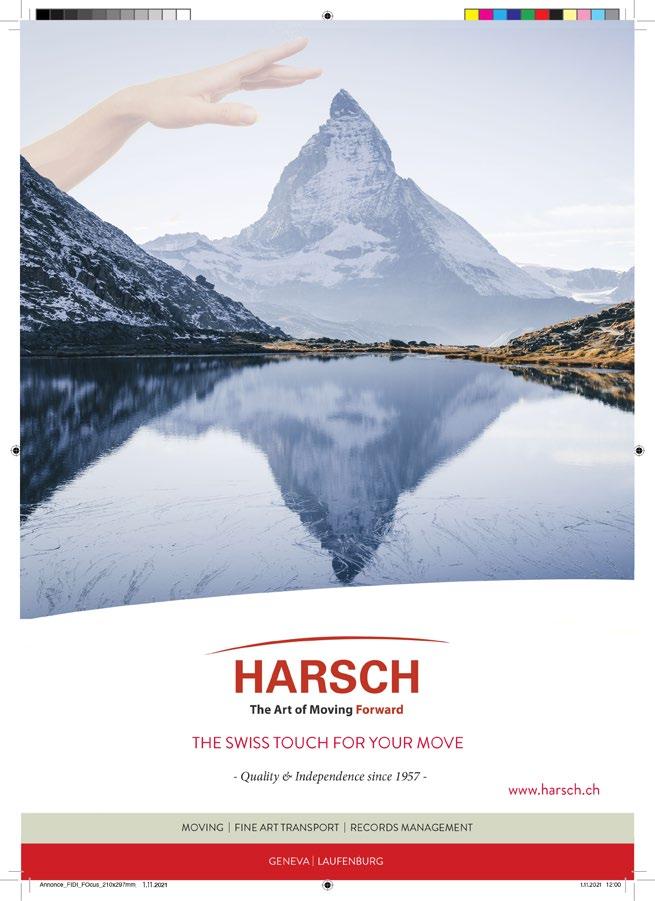
‘Even when I was off work, I was still on duty’
A few years ago, Ben Schmidt realised the moving company entrepreneur’s dream.
The international firm he had founded with just a laptop and a phone in 2008 had grown to an impressive size. He and his team of 25 people served a global market of customers from the Netherlands, enjoying a good reputation among industry agents and priding itself on fantastic customer service.
The risk that Ben, now aged 51, had taken when he left a smaller domestic mover to set up on his own had paid off. Prospects looked good. However, after years of working up to 100 hours a week, he was committed to every aspect of his enterprise.
Previously, Ben had not taken mental health seriously. ‘I was very cynical,’ he says. ‘I was invited to share my views about mental health for a LinkedIn article and commented that, when somebody had “burnout”, it was an easy way to take a vacation. I had no empathy.
‘If people’s normal working day was 8am to 5pm, and they stopped at 5pm, I would have second thoughts. If they were really committed, why not stop at 5.30pm or 6pm? I worked day and night, and would expect it from other people, although I never had a single person in my company with burnout. Overall, the atmosphere was good.’
‘I would always respond’
Ben would typically start work at 5am or 6am and work until 9pm, or later, all week. At weekends, he would work on Saturday mornings. Sunday was supposed to be a day off, but, as Ben explains: ‘When I got a work message – and I received many –I would always respond. Even when I was “off”, I was always “on”.’
It became harder to dismiss warning signs about his health. ‘Your body gives you signals, but you just try to ignore them. When I had a day off, or was on vacation, I would have terrible headaches for the first week, or I was literally sick. If we were away for three weeks, nobody really counted on me for the first one – not a good sign.’
In 2018, after an IAM Convention, he took a week’s family holiday.
‘We were walking through a city, and I was starting to say things that didn’t make sense any more. I couldn’t recognise my wife and children – I saw them standing before me, but it did not ring a bell.
Ben Schmidt, Gosselin

“I was starting to say things that didn’t make sense any more. I couldn’t recognise my wife and children”
‘They thought I had had a TIA (transient ischemic attack, or a ‘mini stroke’). I went to a doctor and was given medicine and told to inform my own doctor.’
In the Netherlands, Ben’s physician said the symptoms were caused by too much stress, for too long. The doctors initially thought it was a TIA, but later found out that it was transient global amnesia. One of the main symptoms is loss of memory and Ben experienced a second occurrence two months later.
‘I was typing an email in the office and no words appeared, only letters.’
The mini stroke-like incidents happened four times (‘the third time, I had no vision, everything was blurred, I had a very bad headache’). Doctors told Ben that reducing his stress was now critical.
In the last incident, Ben could not remember the names of work colleagues and light was painful to look at. ‘I switched off the computer and phone. Others ran the business for six weeks.’
Although Ben had employees managing finance, planning and sales, he realised he was ‘too involved in everything’.
So, in 2019, Ben started a partnership with a new shareholder, who was committed to growing the business.
Being freed up to concentrate on the commercial side of the business gave
Ben a burst of energy, and the changes to the business brought a rapid increase in profitability. At the end of 2019, he sold his moving company, although stayed on board for two years to help the transition, as part of the deal.
In October 2021, however – after he had sold the company – Ben crashed again.
‘I ended up in a burnout. I came home, fell on the floor, could not stand and could only cry. It was a really dark period.’
Ben’s doctors advised him that, without serious rest, he might never recover. He took seven months off, cutting off most contact with the industry and others during this period.
Ben later felt able to become more active again. The Ukraine war had started and he began volunteering for a foundation set up by people in his village, Woudenberg, to bring refugees to live in the Netherlands. It’s a mission he still supports.
‘That gave me a lot of energy and I could see my body responding (positively) again.’
In spring 2022, he joined Gosselin Group to set up a groupage department.
‘I knew people already at Gosselin, and it had very clear boundaries – the job was groupage and nothing else. They gave me the ability to build this department at my pace.’
The past few years have given Ben insight into living better. He enjoys his role at Gosselin and volunteering on his days off.
‘Hard work is not the biggest problem, although there has to be a balance,’ he says. ‘If it gives you energy, then that is OK. But if work is taking all your time and you neglect your family, that is not good.’
Ben and his wife, Marieke, who have two children, made several lifestyle changes. He returned to a hobby he enjoyed as a teenager – building models, including of moving trucks. He also exercises, hiking regularly with his wife, and has changed his diet. ‘I started cooking twice a week, and even enjoying it – it makes my wife happy. Happy wife, happy life!”
He also helps out with household chores. Assisting the foundation that helps Ukrainian people has been positive, too.
‘When you focus on other people’s problems, your own diminish. It makes your life more meaningful.’
Maria Vittoria Molteni was born and raised in Milan and has lived in the UK (she is an Italian and British citizen), Italy, and the United States.
Molteni’s experiences of being married to a transferee – she has moved several times with her husband and their children, to support his career – have spanned many of the highs and lows of relocating abroad.
After graduation, she lived in London, where she worked in fashion, and it was here that their first child was born. ‘Afterwards, we moved back to Milan thinking we were going back to our roots, but it was just for three months. Suddenly, because of a new job, we moved to Rome.’
After three years in Palermo, Sicily, they returned to Rome, where their fourth child was born, before relocating to London for seven years, then moving to Miami, Florida – ‘it was our first experience in America, and probably the toughest’.
Moving with two teenagers and two children at middle school was challenging, because it meant the children had to leave behind schools and friends.
Molteni now works as a life-transition and wellbeing coach. ‘I started when I moved to the US in 2018, when I felt quite lost and lonely,’ she says.
‘Any time we moved, I adapted my job to the place I was living in, not for choice and not for any real passion or purpose.
‘Finally, with coaching, I made an intentional choice. I wanted to make a difference, doing something meaningful for myself and for others in the situation I went through.’
So, what are her tips for people who are relocating as the partner of an assignee, or as an assignee?
‘I was always scared and sad to leave a place behind, but the curiosity to know and live in a new place has always helped me to move forward with resilience and perseverance,’ says Molteni.
‘I navigated the challenges of cultural differences at work or in building relationships, of language barriers and homesickness, I learned how challenging – and rewarding – it can be to adjust to a new environment.’

“Each move brought me different challenges, but also fantastic benefits and opportunities”
‘From dealing with the culture shock to adapting to a new way of life and different work practices, the expat life can be an adventure filled with highs and lows. I experienced an adjustment period of about a year each time, even when I returned to Italy.’
A struggle is when assignees become the ‘sandwich generation’, caught between the needs of children at school and ageing parents, and trying to balance both.
‘Each move brought me different challenges, but also fantastic benefits and opportunities, learning about new cultures and ways of life, such as the Latino culture in Miami, or developing language skills.
‘I did not speak English when I moved to London the first time, and I learned Spanish from scratch when I moved to Miami – without speaking Spanish in Miami, life is pretty hard.’
She adds: ‘Maintaining a work-life balance while abroad is also important, as is creating new social connections in a new place. Meet other families through the kids’ schools or join different events around you.
‘It can take some courage to step out of your comfort zone, but work to create a social support network wherever you are, for you and your family.
‘Meeting new friends will be an
important factor in your happiness and wellbeing abroad.’
For the transferee, Kay Kutt, CEO of Silk Relo, Hong Kong, says: ‘A new role in a new country can be unfamiliar and daunting. In particular, for single transferees, as they don’t have their friends and family network in the immediate vicinity to lend assistance and support.
‘It can be a very lonely time when you relocate to a new place – new peers and bosses and being unfamiliar with the environment.’
While a relocation can be challenging, Kutt says the experience can also be ‘one of the most memorable and cherished moments in a transferee’s lifetime. At a time of our life when we embark on a relocation it can be different for each of us.
‘Whether we see it as a positive experience filled with curiosity, excitement and joy is often down to the context from which we view it. A careerdefining moment, personal growth and packed with positive experiences.
‘Being able to create a sense of belonging in a new world is immensely valuable to our self-worth and mental health.’
A successful relocation requires quite a lot of ongoing support, and assignees should make full use of any programmes available to them.
‘A simple task in our home country can become a daunting and scary moment when we don’t know what we don’t know. We also come up against the frustration of different rules, protocols and bureaucracies that don’t fit in with our understanding of where we have come from,’ says Kutt.
‘A trusted partner company assigned to support a transferee throughout the relocation is a valuable asset to draw upon – in many cases, their new best friend.’
She adds: ‘Transferees that truly thrive in their new location are often those who connect and integrate into their local community, whether that is through their activities outside of work hours, giving them a connectedness through social interactions, as well as being involved in wellbeing support groups.’

Despite its sizeable bureaucratic and infrastructural obstacles, Vietnam’s booming economy and increasing openness to outside investment mean its moving business has never been stronger – while a young, willing and competitively priced workforce, plus free-trade agreements, are helping, too. Andrew Mourant speaks to some of the movers about the ups and downs of operating in the country



The cities of Vietnam have become thriving, almost febrile centres of global business and trade. Even through COVID, the country maintained modest economic momentum and is now experiencing growth levels that most other countries can only envy.
Since the Vietnam war ended almost 50 years ago – America’s ignominious flight from Saigon forever etched on the memories of those who watched it –the country has had a stable, albeit authoritarian, government. It avoided the genocidal horrors of neighbouring Cambodia and has become increasingly attractive to multinational companies (MNCs) since opening up to foreign investment 35 years ago. So, what are the attractions?
For starters, Vietnam has a young labour force that is hungry for work. Half of its near-100 million population is under 30 and there’s a growing middle class, a large consumer base, and a skilled workforce.

Next, there are competitive labour costs – on average, half those of China – and Vietnam’s openness to free-trade agreements with the EU, the UK, Australia and many more. South Korea and Japan now have a big presence in the country.
The country’s law on foreign investment, dating from 2020, defines operating boundaries and is intended to ensure adequate protections. Another draw is the corporate income tax regime: priority sectors pay less than the standard 20 per cent and, in some cases, are exempt. Where the normal VAT rate is 10 per cent, some sectors pay five per cent, or none at all, among them food, medicine, education, health care, public transportation, agriculture, and renewable energy.

According to the General Statistics Office, Vietnam’s gross domestic product grew by 5.66 per cent in the first quarter of 2024, led by manufacturing and service sectors. Ho Chi Minh City (formerly Saigon) remains its commercial driver. The world’s biggest brands have a presence there, Nike, Adidas, Google and Amazon among them. But Hanoi is growing, too. One of the capital’s attractions is its lower cost of living –companies often spend more on staff located in Ho Chi Min City.
This astonishing growth has been achieved despite Vietnam remaining entangled in bureaucracy. Its red tape is deep-rooted and persistent. This has implications for the relocation industry, shaping how FIDI Affiliates go about their business and the direction this takes.
‘This is a country of conflicts,’ says Stephanie Ralainarivo, General Director of Santa Fe Relocation Vietnam. ‘Large corporations are expressing interest in establishing a presence in Vietnam. There are opportunities available, but the bureaucratic processes can often be discouraging because of their length and complexity. Only assignees employed by licensed companies, authorised by the government to hire skilled foreigners with diplomas and experience, will receive a two-year work permit. The government still relies on physical documents and stamps, leading to unnecessary duplication and time spent at government offices.
‘Some clients struggle with the time it takes to resolve, but, if you appreciate Vietnam, you should try to understand the country instead of imposing your beliefs on it.’
It’s an important message, because foreign companies and investors can be thrown by Vietnam’s cultural differences and language barriers if they want things done rapidly. Regional language variations further complicate matters, to say nothing of the country’s legal maze and variable levels of enforcement.
Ralainarivo emphasises the importance of accuracy, as Santa Fe’s work for clients involves ensuring compliance and orderliness.
Santa Fe has been operating in Vietnam for 17 years, offering visa and immigration services, moving services, and destination services provision (DSP). The company hopes to expand its business if the government can reduce bureaucracy.
Hanoi offers a broad spread of opportunities for movers. ‘We have ambassador and NGO clients; also, clients from the UN and World Bank,’ says Erwan Dallasta, Asian Tigers Office Manager. ‘There’s a lot of investment from companies that decided to switch from China because of Chinese regulations – they want to diversify their supply chains.’ Mounting political tensions have been a major factor for businesses choosing to exit the country.
However, Vietnam’s own rules can also be complex; and the introduction of new post-pandemic laws have caused further issues. ‘That’s a challenge for us,’ says Dallasta. ‘DSP is growing – a lot more companies want

“If you like Vietnam, you try to understand the country rather than force yourself on it”
advice on work permits and helping with shipments.’
Despite being a boom country, navigating parts of Vietnam remains difficult, throttled as it is by poor infrastructure. Traffic is so bad that the government bans trucks from the roads between 6am and 9am and 4pm and 9pm, around which the removals industry must operate as best it can. The news isn’t all bad. ‘There have been real improvements to the highway system up and down the coast, which makes things a lot easier,’ says Asian Tigers Country Manager Matt King. ‘We can also send things by rail and sea.’
Other crucial infrastructure improvements have ground to a halt, however, such as new bridges linking roads directly to ports. Ring roads around Hanoi, where there are factory areas north and south, also await completion – quite when is hard to guess. ‘I’m not holding my breath,’ says King, an American who grew up in Thailand and has been with Asian Tigers for 23 years.
One knock-on effect of inadequate roads is high logistics costs – ‘a bottleneck to business’, says Saigon Van owner Kim Ngoc. ‘There’s room for a big improvement – the rapid growth of e-commerce after COVID demands better logistics services, especially last-mile delivery.’ Yet, undaunted, many small companies have become new entrants to relocation logistics – stimulated by the heated
real estate market – competing with larger companies on price.
Meanwhile, post-pandemic, the number of people arriving in Vietnam from Europe or the US to work in MNCs has fallen. ‘Localisation of staff has been very evident,’ says Ngoc. ‘With new investment from China, Korea, India and Singapore, there are more Asian expats, but they tend to come without the family and stay in apartment buildings with furnished or semifurnished properties. This has posed a big challenge –if we only focus on expat family removals, it will be very difficult to sustain the business.’
Saigon Van has now positioned itself as a destination services provider, with a growing emphasis on teaching expats what to expect when they arrive. ‘Vietnam’s culture, because of its history, is unlike any of its neighbours,’ says Ngoc. ‘Therefore, we have a support programme for new investors and corporates. It prepares them with the dos and don’ts, as well as the secret to success in dealing with Vietnamese in their daily life and at work. It also takes in religion, so expats can understand more deeply our reasoning and beliefs.’ Santa Fe also offers cultural awareness as a standalone service.
The country often presents a different face from that of its neighbours, says King: ‘In Thailand, everyone smiles and is welcoming. In Vietnam, they aren’t. You have to be respectful... you are in their country.’
This applies particularly to the north, adds King, who feels it is a legacy of the country’s bitter war against the Americans. ‘Life was harder there... the south was always more westernised. It can be harder to win trust in the north when doing business... people are

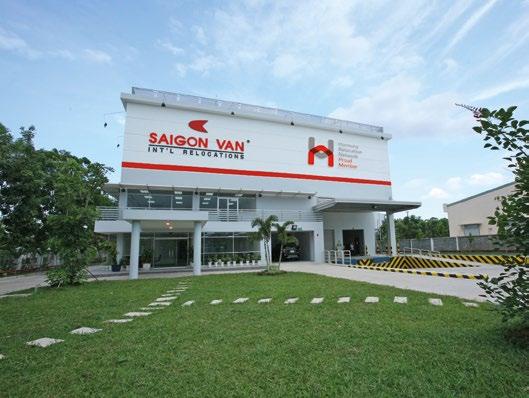

more sceptical. Getting stuff done can be frustrating.’
But, he says, Hanoi has changed a lot, ‘for the better’, and is earning a dividend from ‘walking the tightrope of keeping the Chinese and the Americans happy.’
Vietnam is a country where family bonds are strong and crime low – it’s illegal to own a gun. One striking feature is that it spends far more than its regional neighbours on education, and the most on international schools. ‘The Vietnamese quality of spoken English is high – they really understand that it is important in business to be fluent,’ says King.
Saigon Van has been able to grow a business stream from its work for the British International School.
‘Teachers don’t have the budget for moving like expats from corporate accounts, and mostly have small shipments,’ says Ngoc. ‘We cluster teachers going to the same destination region to fill the container, giving them a cost saving. Our consolidation business started from there.’
From almost nothing 20 years ago, Vietnam’s rapid internet expansion means around 70 per cent of its population now have access to the worldwide web. In an IT-hungry nation, industries such as semiconductor production have taken off in a big way, drawing engineers and middle managers from abroad.
It’s hardly surprising that the work, and rewards,
“There’s a lot of investment from companies that decided to switch from China because of regulations”
lure young people. The downside is that it shrinks the pool of candidates seeking a career in removals. ‘Youngsters want to work with their brain,’ says Ralainarivo. ‘People over the age of 40 are the best to have, but are often already in jobs they like –they’ll only jump around if you double their salary. At interview, they are interviewing you.’
Some recruits also struggle with the concept of always-on customer service, she adds. ‘Moving is emotional – [clients] want you available almost 24 hours a day.’
However, Asian Tigers appears to be riding the challenges of recruiting staff. ‘We have long-term employees in the office, and we also attract young people,’ says Dallasta.
In one area at least, the digital tide has receded amid Vietnam’s preference for doing business face to face. During the pandemic, Asian Tigers carried out lots of video surveys, but the personal touch has returned – or, as Dallasta puts it, ‘we’re back to old school’.

Australia’s largest branch network, offering complete moving and mobility coverage from coast to coast since 1911.
Australia. Think Grace.

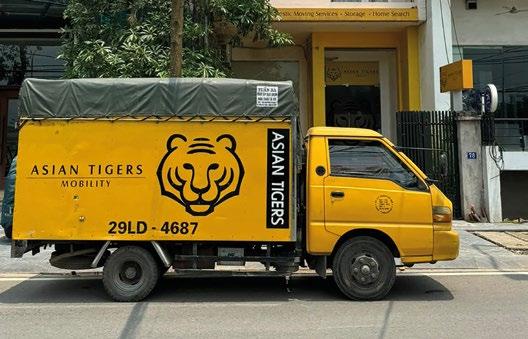
In the wake of Vietnam’s dash for growth, sustainability has become a growing priority for some companies. Santa Fe is among those that have taken practical steps down this path. Many are small, but the view is that every little helps.
Printing on two sides of paper is mandatory if a document is intended for in-house use only, and there is only printing if necessary. They also recycle cartons that are in good condition for local transportation purposes.
On Fridays, employees are allowed to work from home to reduce electricity and petrol consumption, and they share rides to work. In addition, Santa Fe has introduced electric vehicles and addressed its paper-based culture by creating a secure platform through which clients and staff can share documents digitally.
There have been a few setbacks in the upward trajectory of this hyperactive country. For instance, Ralainarivo, based in Ho Chi Minh City, has recently seen a slowdown in banking, construction and real estate, although these are not major industries. She remains optimistic, however, and hopes these industries will return in the next 15-18 months.
When speaking with business communities,
“The rapid growth of e-commerce demands better logistics services, especially last-mile delivery”
the opportunities are still in manufacturing and export, IT and digital economy, real estate –despite the current challenges – infrastructure, and renewable energy.
Meanwhile, Asian Tigers is eyeing Vietnam’s third city, Da Nang, which lies in the middle of the country. ‘We handle a lot of moving work for hotel staff in Vietnam, but these are smaller moves. Currently, Da Nang is our second-largest market, but it is not yet large enough to warrant opening an office there, but we are keeping an eye on it,’ says King.
Should Vietnam ever be liberated from the shackles of red tape – and lobbying bodies, such as the chamber of commerce, are leaning on government for that to happen – there could be another surge.
‘When opportunities arise, we act quickly to seize them,’ says Ralainarivo.
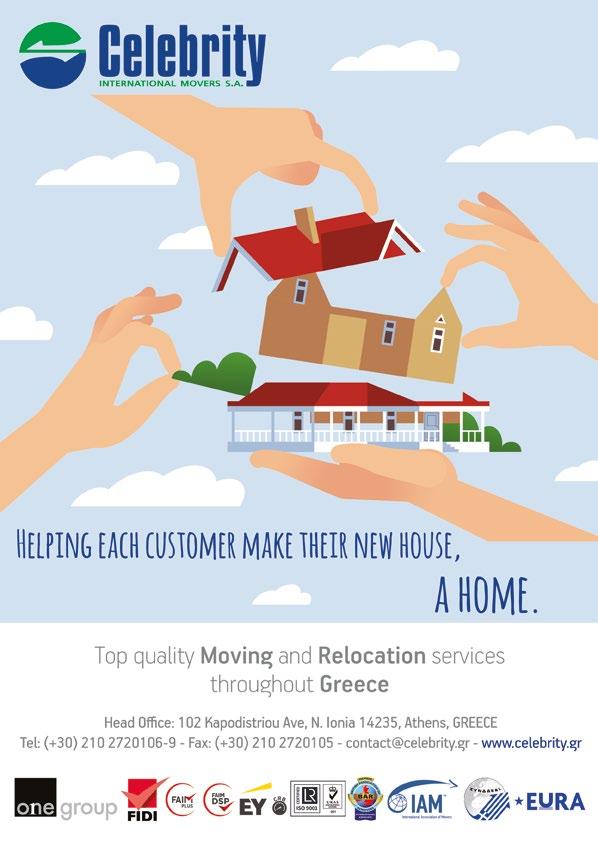
The FIDI office team is dedicated to spreading FIDI brand awareness far and wide, aiming to keep the industry up to date with our latest developments and reinforce our leading position.
As FIDI’s Customer Relations and Membership Manager, I frequently travel to industry events and meet FIDI Affiliates and prospective members from around the world. We do this during the very busy IAM, where we exhibit annually, with a booth, but also at other industry events, where we meet representatives from companies that we don’t have the opportunity to connect with at the FIDI Conference or IAM.
In spring 2024, I travelled to Vietnam to attend the International Mobility Alliance (IMA) annual conference, the brainchild of CEO Patricia Jade Ooi, which brought together almost 300 attendees from a wide range of countries. IMA gives delegates the opportunity to meet in well-organised 15-minute slots throughout the conference days, allowing dedicated and productive meetings to take place.
There was also an array of social activities, starting with a fun ‘Hanoi race’, which allowed attendees to network and compete to find Hanoi’s treasures. Those who were lucky enough to come a day or two early, or to stay after the event, were also treated to an organised group tour of the spectacular world heritage site, Halong Bay.
I was delighted to represent FIDI again at this event, after a four-year interval, and to be able to hold effective meetings with Affiliates, prospective members and applicants, and help them get the most out of FIDI Global Alliance.
The theme of this year’s conference was sustainability with purpose. During the opening ceremony, I gave a short presentation explaining FIDI’s approach to the conference theme, and highlighting the latest developments at FIDI, including the proposed netting service, the launch of the Carbon Calculator, and the introduction of our new FIDI DSP category.
There was a lot of excitement and questions from delegates, who had an interest in one or more of these topics, with FIDI’s efforts on sustainability proving particularly popular.
Shortly afterwards, FEDEMAC held its annual conference and Young Movers Conference (YMC) in Málaga. The weather was surprisingly mixed, but it did not dampen spirits; everyone had the chance to sample the best of Andalucia while connecting and networking on the renowned Costa del Sol.
FIDI’s Secretary General, Jesse van Sas, and I attended this year’s event, where FIDI was a proud gold sponsor of the 30th edition of the YMC.
The YMC format was adapted this year to including a ‘speed dating’ networking element a day before the official start. As with the

IMA, this proved a great way to make time for dedicated chats with prospective members and Affiliates, to address predetermined topics. It was also great to see a marked increase in worldwide attendance, especially from movers in the Middle East and Latin America.
With the YMC conference well under way, I caught up with FIDI Affiliates, prospective Affiliates and industry newcomers at the FIDI table, while Jesse took part in a panel discussion on undocumented work. Highlighting the dangers of this, Jesse shared his knowledge of a case of an undocumented worker committing a serious crime at a client’s residence, which led to a mover being sued and facing significant legal issues.
This was a stark reminder to those in attendance to always ensure supply chain management and background checks are in place, as per FAIM standards, so movers know who is acting on their behalf at a client’s residence.
In the afternoon, there was a great interactive artificiaI intelligence workshop, where we learnt how ChatGPT can facilitate day-to-day work in the moving business –by creating packing lists from photos and formatting professional email responses to clients, for example.
The YMC ended with an amazing traditional horse-riding and flamenco show at a bullfighting ring near Estepona. I am already looking forward to participating in next year’s event, which will take place in Warsaw, Poland.
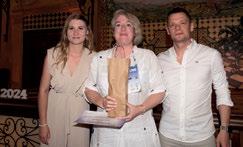



With Scotland’s rich past as inspiration, delegates at the 2024 FIDI Conference in Edinburgh came together to network, socialise and debate trends and future strategies – while landmark new initiatives were also launched. Dominic Weaver reports from another historic FIDI event
The cobbled streets, bagpipes, and historic battlements and buildings of Edinburgh provided the backdrop to this year’s FIDI Conference, where more than 650 delegates from around the world met to consider the issues currently having an impact on the global moving and relocation sector. The four-day event – which took place at the city’s Sheraton Hotel from 12-15 May, and was preceded by the FIDI 39 Club’s conference – featured business sessions and interactive workshops on topics including sustainability, response to global crises, technology and artificial intelligence, and the next generation of movers. In addition, there was a wide array of impressive, colourful, and fun cultural events – from a welcome reception at Edinburgh Castle, sponsored by AMJ International, the FIDI 39 Club ceilidh (kay-lee) and dinner, and a Tour4All visit to beautiful Gosford House on the outskirts of the city, sponsored by MoveAssist, to a FIDI UK evening at Dynamic Earth Edinburgh. A closing gala dinner was also held at the National Museum of Scotland, sponsored by M. Dyer
Here are some of the photographic highlights of the event.







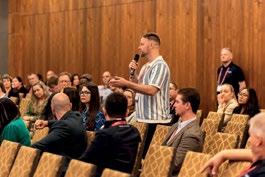


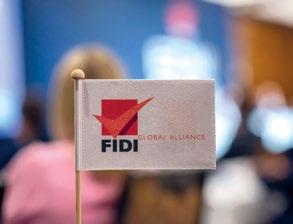


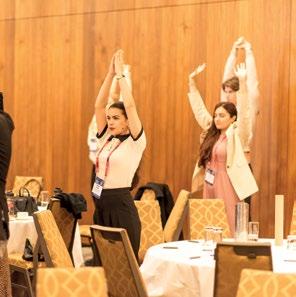
Cultural and social activities during the conference had something for everyone. There were ghostly and historic tours to Edinburgh’s Blair Street Vaults, visits to the Palace of Holyrood, Loch Lomond, a gin and whisky distillery, and Trip Advisor’s top UK attraction in 2023 – the Royal Yacht Britannia. There were also morning hot-yoga sessions, a golf competition and a Gerson-sponsored fun run.

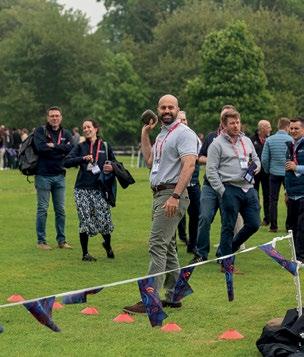










The 2024 FIDI Conference in numbers:
650 delegates
530 at the welcome reception in Edinburgh Castle
547 at Roll Call
395 people went on the Tour4All to Gosford Park
528 places on cultural tours
575 attended the closing gala dinner



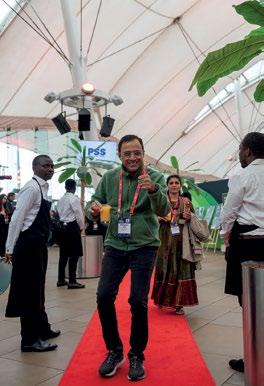
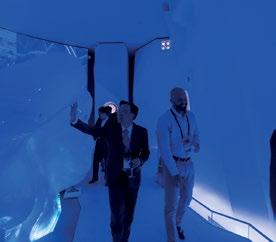




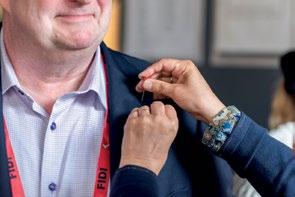








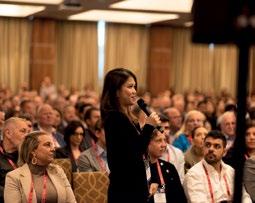










Lydia Cope reports on the main updates and developments to come out of the Conference Delegates’ Meeting
he FIDI Delegates’ Meeting and General Assembly convened in Edinburgh, to allow FIDI Association representatives from around the world to come together and discuss key topics, FIDI developments and industry trends with the FIDI Board and FIDI office.
The following is a summary of the key highlights.
FIDI President Derek Duffy and Secretary General Jesse van Sas provided an overview of FIDI and its services. With membership numbers back up to 594, and with plenty of new applicant audits in the pipeline, FIDI has recovered fully from the pandemic years.
FIDI’s Treasurer emphasised this trend while sharing the financial results of 2023, with the recovery bolstered by a successful conference in Bangkok that year. The financials for 2023 were subsequently approved by the General Assembly.
The latest FIDI Global Business Cycle Barometer results show cautious optimism for the coming quarter, a reassuring trend that follows a reportedly quiet quarter of 2024 for many Affiliates.
Key findings from the FAIM 2022 Standard’s audit reports so far demonstrate that a staggering 87 per cent of Affiliates are now digital-ready, a significant improvement from just two years ago.

Meanwhile, corporate sustainability (ESG) moved from development in its early stages to a defined process, with Affiliates developing risk management tools for their businesses as a result – in addition to new cybersecurity measures.
FIDI Academy attracts record numbers of students, and the team of trainers continues to develop new courses. A new corporate sales seminar is ready for rollout in the autumn and a financial training course is on the agenda for future development. Development of forums for chief financial officers and chief information offices are also on the horizon.
FIDI Focus remains a key marketing tool for FIDI and there was an open debate among delegates about how it could be further developed, perhaps to target global mobility professionals and corporate customers. These options will be further analysed, for discussion at the next Delegates’ Meeting.
Full operational reporting for 2023 can be found in the FIDI 2023 Activity Report, which is available to download on FIDINET.
The General Assembly unanimously approved the new mechanism for the financing of the FASI fund. The annual contribution will remain static, at the current €500 per full Affiliate and €150 for affiliated Branches, on condition that the fund remains between €1.75m and €2.25m.
Any deviation below or beyond the above range will lead to an automatic one-time adaptation of the annual fee, to bring it back within the bandwidth.
After a review of the changes, the new FIDI Professional Cooperation Guidelines (The PCG) were approved by the Delegates’ Meeting, together with the updated FIDI Statutes, which were approved by the General Assembly. Notable changes to the Statutes include the introduction of articles to accommodate the new FIDI DSP category, and the introduction of netting as a potential FIDI service. This will allow the FIDI Board and FIDI office to continue with the next steps in its implementation, namely to draw up the rules and costs to run the FIDI netting service. More information on this important development will be shared with Affiliates in the summer months.

Key appointments were confirmed by the Delegates’ Meeting and General Assembly, including the reelection of several board and committee members for new terms. Bill Graebel was elected to the Board Nomination Committee, while Marcel Jörg was elected to the FIDI Board. Jörg will become FIDI’s next Treasurer once the current office holder, Cédric Castro, becomes FIDI President in 2025.
As FIDI drives forward with its sustainability initiatives, the Delegates’ Meeting was updated on the successful launch of the FIDI Carbon Calculator, which is free for FIDI members. The tool is in its infancy and will be constantly developed and enhanced - to include packing materials carbon calculation, for example. A knowledge hub has also gone live to explain the various scope requirements.
This will be held in Dubrovnik, Croatia, from 27-30 April 2025. Future FIDI Conferences were also discussed: it will be hosted in Osaka, Japan, in 2026, and in Latin America in 2027. Though not confirmed yet, Buenos Aires, Argentina, was the frontrunner location at the time of the Delegates’ Meeting. The conference will most likely return to Europe in 2028.
The FIDI 39 Club President confirmed that the membership structure will change shortly, to allow for digital and in-person membership. The Club has enjoyed unprecedented growth in recent years and now has 155 members, many of them digital members already. The membership fees will reflect the benefits that each category gets, with a €150
subscription for digital membership and €250 for inperson membership.
The transportation of lithium-ion batteries was discussed further; FIDI is continuing to work with other associations, notably the IAM, to monitor the situation and to see what can be done to facilitate their transportation as household goods effects. Cybersecurity insurance was also broadly discussed by delegates. As the threat of cyber attacks continues to grow, FIDI is looking at the best way to educate and assist its members to avoid these threats to their businesses.
In the wake of high-profile data-security breaches, delegates were reminded that free Academy courses on digital proficiency and cybersecurity are available for all FIDI-affiliated employees, to reduce the risks for their companies.
● The agendas, attachments and draft minutes from the Delegates’ Meeting are available in full to download on FIDINET.


Sustainability guru Lucas Simons gave the conference its keynote address on Monday, guiding delegates through the inevitable transformation it has ahead.
In the session ‘Embracing change: A strategic vision for sustainability in the relocation industry’, Simons said movers and relocation companies must become ‘system thinkers’ and understand that climate change isn’t actually ‘the problem’; it is instead a natural outcome of a system of rules. Tackling this system was the essential challenge, he said; this is a complex process, but the only way to make effective transition.
Simons said that despite apparent differences between various industries when it comes to sustainability, every sector is currently asking the same questions. ‘Who is going to pay for it? Who bears the risk? How do you work together in a value chain differently? What is the role of new technologies or concepts? What is the role of government?’ he said.
With the rules of the system currently the same across all industries Simons said that the same outcomes are inevitable. ‘If you really want to change it then we need to understand what those rules are

and how you change those rules in order to come to another outcome.’
Movers must become system thinkers, he said, thinking not in linear fashion, but ‘in loops’, which explain how the system is working and the fundamental changes that are needed. To do this, every industry needs to find the answers to the same essential questions.
The first of these, is ‘What is the market competing on – and how is this causing your sustainability problems?’ which in turn will help us understand both what businesses are doing – and what they are not. For the many industries competing on lowest price, it causes a drive towards larger, more intensive companies, which creates cost pressures for suppliers, too. Investment in environment-friendly initiatives is therefore less likely to happen ‘because it’s not how you win the game’.
The second question regards policy regime, and the role government plays in perpetuating patterns – such as subsidies in the agricultural sector driving excess production, or not taxing air travel sufficiently.
Third is ‘Who feels the consequences?’ ‘The ones that are benefiting from the system are usually not the ones that feel the direct consequences of the unsustainable system,’ he said, ‘this is sort of a system law.’ Businesses are not directly ‘feeling’ the negatives impact of plastic pollution, climate change, and other outcomes, while the financial benefits of the status quo continue.
The fourth and final question is ‘How attractive are the alternatives?’ ‘Can we make your sector more sustainable?’ he asked. ‘Yes? Then why don’t we?’ With plenty of initial reasons not to do this, and the rules of the game stacked against the possibility of positive change, there are now clear transitionary phases that industries must move through, he said.
Simons believes most moving business are still in the early phase of pilot project and actions focused on the individual companies themselves. ‘The big question is how can we go to phase two,’ he said, ‘How can we make sure this is demanded by your clients and there’s a willingness to pay?’
He offered five specific suggestions that moving firms can implement to accelerate the process.



Applauding the launch of FIDI’s Carbon Calculator, he said, measurement of carbon impact was an important first step: ‘You need to have an idea of your footprint because then you can show what you are doing to reduce it’; and committing to a goal such as zero emissions by 2050 was a clear target.
Next, he said, was moving from individual projects to industry standards; with the Blueprint for a Green Move produced by FIDI for the Coalition for Greener Mobility providing a good starting point. Third is to organise pioneers without worrying about having everyone on board – this will come naturally as competitive forces start to come into plan. Fourth is to develop support structures – resources, research, and other tools – for these pioneers, and finally to create a value case with incentives for clients to buy into the new way of working.
Panel session:
Between giants and clients: how can movers gain the upper hand?
Panellists:
Nicki French, Grace
Samuel Mergui, Santa Fe Relocation
Annika Roupé, Alfa Mobility
Derrick Young, Paramount Transportation Systems
Moderator:
Jesse van Sas, Secretary General FIDI

This panel session took on one of the mobility industry’s most persistent questions: how do movers and global mobility suppliers regain their power when they are dealing with larger clients (and larger suppliers for services such as freight and insurance) to negotiate on quality and other aspects, rather than just price?
Panellist Nicki French, of Australian mover Grace, highlighted the importance of personal relationships and that clients understand the highly personal nature of a move when compared with other logistics jobs. Annika Roupé, Alfa Mobility, said the company recently reviewed its approach to a recent RFP to emphasise this. ‘People don’t live in warehouses,’ she said. ‘We
are taking a personal touch when we describe to the customers – and to procurement – what we are doing.’
The panel agreed that it was important that movers educate procurement teams. ‘We need to teach the corporates what it’s about,’ said Paramount Transportation Systems’ Derrick Young, who advocates ‘giving HR departments the tools to go to procurement and show them’ the value of a well-executed move.
Sales teams have a vital role to play in this process, too, so firms need to ensure they are training salespeople to understand the procurement process and be able to represent the quality of the solutions their business can offer, beyond short-term financial metrics.
‘We need to help our sales team, to discuss equal to equal with the procurement team,’ said Samuel Mergui of Santa Fe Relocation.
The panel discussed strategies for success, including focusing on building strong relationships with clients – which if done early can prevent the need for companies to go through the extensive RFP process. ‘Go upstream, build those relationships, and you can cut the need for a full RFP off at the pass,’ said French.
In addition, good cost management practices have a role to play, while smaller companies should consider targeting strategic market segments, identifying opportunities that play to their strengths and building expertise and experience in specific niche markets.
A mover’s role in a world of crisis
Panellists: Curt Clemens, Move One Relocations
Ebru Demirel, ASYA International Movers
Malcolm Pearson, Reason Global
Anthony Shipp, M. Dyer Global Moderator:
Magali Horbert, Sustainability and Strategic Communications Manager, FIDI
With geopolitical tensions at their highest level globally since World War II, international moving businesses have recently found themselves challenged to deal with more unpredictable and fast-moving situations – from climate change-related incidents to war – in



delivering their services. In this session, the panel discussed the immediate impact on movers, their customers, and their families, and the implications for costs, insurance, and overall strategy for working in these difficult emerging operating environments.
The audience heard from Anthony Shipp of M. Dyer Global, who was involved in the response to last year’s fires on the Hawaiian island of Maui, and who said mobilisation of the community was important in reacting well to the crisis. ‘Within 48 hours we were able to assemble an enormous amount of supplies that were needed,’ he said.
The panel discussed the essential part of monitoring fast-moving situations, the whereabouts and safety of staff members, and communicating effectively to ensure people were kept informed and up to date about developing scenarios and could adapt responses in the right way. Tools such as WhatsApp or Google Workspace were effective, said Shipp.
When it came to mitigating risk, Malcolm Pearson, of insurance broker Reason Global, encouraged businesses to develop their own risk plans and to involve their insurance provider early to help them develop and validate these.
He added that ‘climate change is making a huge difference to how insurers look at risk’, adding that marine insurance and protection against cyber-related events were both becoming increasingly important to businesses including movers.
Ebru Demirel of ASYA International Movers in Turkey – where regional economic and political instability has caused uncertainty – said: ‘Business continuity is important but the ultimate aim of risk management is to make sure the company is resilient when you have a crisis.’ She added that the independent assessments of businesses and their finances, as under FAIM certification, is vital.
Curt Clemens, Move One Relocations, said that widening the remit of business was a useful tool in managing risk: ‘Most successful companies now have a diversification strategy to spread their risk,’ he said.

How to build a young, resilient workforce of movers?
Panellists:
Gordon Bell, Asian Tigers and FIDI Board member
Simon Hood, John Mason International
Steve Jordan, The Mover magazine
Daniela Krumdiek, Express Transports
Christina McCarte, AMJ Campbell International
Moderator:
Jackie Stouffer, JK Moving Services and FIDI 39 Club President
In one of the liveliest sessions, panellists looked at how to attract and retain younger movers, addressing the changing demands of the next generation, as well as the image of the global mobility sector overall.
Discussing the changing expectations of employees, Gordon Bell of Asian Tigers and FIDI Board member, said: ‘They want it all – they want your job, and your salary package, and they want it in two or three years... this can be a good thing and it can be not so good, too.’
But it’s OK to say ‘no’ to these demands, said Simon Hood of John Mason International, who said firms needed to be flexible but realistic about the impact of this on day-to-day operations. ‘Yes, it’s a people thing,’ he said, ‘but they are also here to work for you, to make money for you, and to keep everyone else in jobs as well.’
Christina McCarte from AMJ Campbell International countered saying it was about companies working with ambitious potential recruits, creating a realistic plan to get them to where they want to be.
‘They do want it all and that’s good. We need to be able to say yes, we’re willing to invest time and energy and mentorship to bring a new generation in,’ she said.
The key is finding a balance, according to Daniela Krumdiek of Express Transports, who said the company’s experiences during the pandemic illustrated the value of working in a hybrid fashion – both in terms of working hours and accounting for the needs of different employees. ‘It’s about accommodation of what the younger and older generations want,’ she said. ‘It’s about listening and communication.’
The panel examined the image of the industry and acknowledged the work that was needed to raise its profile and awareness of the benefits of some parts of the sector such as working with people across the world and international travel.
McCarte said there were often unseen career paths in moving from operations to management, which should be promoted. ‘Four out of 10 management will tell you they started on the trucks. So why don’t we advertise that?’, she said.
Steve Jordan, Editor of The Mover magazine, said the industry should consider the huge pool of talent it has already. ‘Look around this room, at some of the young people we have in this industry,’ he said, ‘I have been immensely impressed by them all’.
● You can watch the full sessions and additional conference workshops on FIDI’s YouTube channel.
Principal partners:






Major partners:



Supporting partners:










Board member and future Treasurer Marcel Jörg brings a moving pedigree and a personal love of finance to the FIDI Board. As his Board tenure begins, he speaks to FIDI Focus Editor Dominic Weaver about his background, the new international netting project and the challenges ahead in his new role

Marcel Jörg, of Gosselin, has been elected as the most recent addition to the FIDI Board, joining as Board member and future Treasurer of the organisation.
Following in the footsteps of his father, Ernst, who served on the Board, including a term as President, Jörg is the first person from Gosselin to become a member of the Board (although the company’s Jessica Deutschmann is past FIDI 39 Club President).
‘As my father was a Board member and President, I am very familiar with what it means to be part of FIDI,’ he says. ‘I was very engaged for 18 years as a FIDI Academy trainer and, as President of FIDI Switzerland, I have taken part in Delegates Meetings for the past eight years.’
Trained in economics and with an early career in accountancy, finance and treasury management in the US, Jörg brings qualification and experience to his position, but also a love for financial affairs. His first employer, a US technology company, ran an EMEA division from Switzerland – and, he says, ‘gave me a lot of insight; I loved it’ – before he was sent to the company’s Silicon Valley headquarters to take care of financials after a merger.
Jörg says that, as an only child, ‘it was the obvious thing to join the family business’ after his father established Packimpex in 1977. ‘I was on a career path in the US where my father was getting worried that I would never come back, so, when I was 27, I joined the moving business and have stayed in it ever since.’
His passion, however, has always been for the commercial, rather than the moving, side of the company. ‘I’m not a mover,’ Jörg says. ‘I don’t come from the survey and move coordination front, nor the freight-forwarding side. I never had the strongest drive to be in these areas, but I saw the business aspect as very interesting. I have always been on the administrative, strategic and leadership side of the business.’
When Packimpex sold its moving arm to Gosselin, retaining only its destination service provider (DSP) services, Jörg moved with this part of the business. His aim was to make the purchasing company’s moving division a success, ‘which it wasn’t at the time I joined’. ‘That was a challenging and ambitious mission,’ he says, ‘and I liked it so much that, after seven years, I’m still leading that division at Gosselin, within which are eight FIDI Affiliates.’
Jörg believes ‘the timing is right’ for his
appointment to the FIDI Board. With the spotlight on the value for money that mobility industry associations provide for their membership, he is keen to ensure that FIDI continues to give its Affiliates the best possible returns for their fees.
‘The treasurer has a role to play in making sure we have the right balance – that we provide services at the right cost and that we are lean and efficient internally, so Affiliates get maximum benefit at the best price possible,’ Jörg says.
FIDI’s new netting system will be part of its evolving value proposition, and Jörg, who will have a central role to play in its rollout, has first-hand experience of the advantages of using such a system.
‘Netting adds a lot of value to members, although it can be complex to understand if you’ve never been exposed to it,’ he says. ‘Packimpex used to be a member of Harmony, where we had the benefit of netting with most of our partners at the time. When our moving and storage division was sold [to Gosselin], we no longer had this, and our accountants – but also the management team –really missed having it.’
Accordingly, Jörg expects FIDI’s membership, and FIDI itself, to feel major benefits from the increased efficiencies and ease of trading that netting will bring.
‘It really is a service that adds value,’ he says, ‘and it will drive companies towards becoming a FIDI member, because they will be less afraid of doing business internationally.’
Contract terms and timely payment have been in the spotlight recently, and Jörg believes there has been an improvement in businesses extending payment time to suppliers, thanks to better discipline from Affiliates. However, he says this long-standing problem is likely to remain for some time.
On top of his financial duties for the FIDI Board, Jörg is keen to get involved in matters of sustainability. ‘There is a lot of talk about ESG [environmental, social and governance] and sustainability, and FIDI has the opportunity to define what a sustainable moving company looks like,’ he says.
In addition, Jörg believes there may be a chance for the organisation to build on the growing sustainability elements in FAIM, to develop a dedicated benchmark and logo for Affiliates that

“Netting really is a service that adds value and will drive companies towards becoming FIDI Affiliates”
meet specific criteria in this area. ‘Rather than a simple pass or fail, we could have a rating system for sustainability,’ says Jörg, who would like to see FIDI give even more guidance to Affiliates on developing their ESG credentials.
‘We could dig deeper into what companies do, and guide them towards what is possible and what is best practice. There is a lot of talk about it, but I feel there is more we can do to encourage businesses to become greener.’
He adds that there is a potential role for FIDI in addressing the current ‘lack of connectivity’ when it comes to technology.
‘There is a pain point when it comes to data exchange in the supply chain, between customers, RMCs, and FIDI Affiliates,’ he says, ‘This might be a “data warehouse”, where companies put their data in for others to access.’
While this would be a challenging project – and one that may even fall outside of FIDI’s remit –Jörg says there is a place for FIDI’s leadership in conversations about connecting the industry and
moving forward generally sluggish digitalisation faster. The same goes for recruitment, he says, where movers need help to prepare for the future, focusing more on employing people and bringing in skills from outside the industry, to ensure its longevity.
‘We need to make sure we don’t just go after those who know what moving is, but also go after the next generation of talent and ensure the industry is prepared to give them what they expect,’ says Jörg.
‘Training and attracting new talent, and bringing to the industry those with different skill sets or values, would make it more sustainable in the long run.’
For now, though – at the start of what will, hopefully, be a full eight-year tenure as Board member/Treasurer – Jörg says he will take time to understand better the priorities of the FIDI Board and how best to address them.
‘I don’t know yet what all the current pain points and big discussions are on the FIDI Board,’ he says. ‘As a new member, it’s not for me to say what the priorities should be now. I will be there to listen and find out and learn, and then, eventually, take some ownership in certain projects.
‘If I can contribute to FIDI growing in terms of membership, and being in as strong a position – or even better – in eight years’ time, then I will consider that a job well done.’

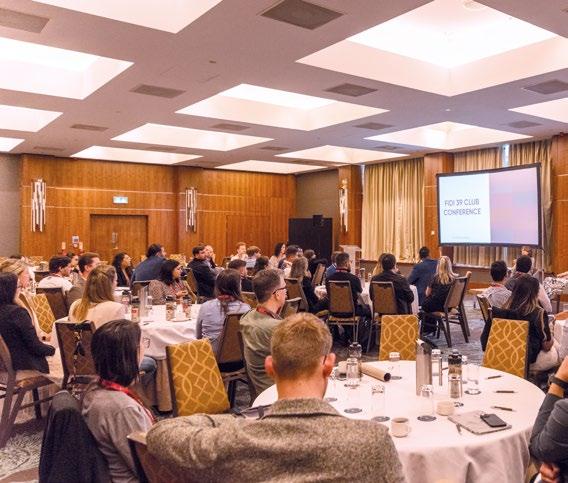
After a lively debate on the next generation of movers at the FIDI Conference in Edinburgh, FIDI 39 Club President Jackie Stouffer gives her thoughts on attracting and retaining quality talent in the moving industry

Recently, I received a message from my firm’s reception telling me that a company had left a message for me regarding the Feed the Animals Conference in Edinburgh.
I read this several times, perplexed, thinking how did this person get my contact details and what could they possibly want? Then I said it out loud and it dawned on me: the FIDI Annual Conference! I had good laugh and am thinking about petitioning the Secretary General to officially adopt this as the new conference nickname.
Now that I have captured your attention, I’d like to draw it to the recent panel that the FIDI 39 Club hosted at that annual conference in Scotland.
It was the first panel that the FIDI 39 Club had hosted and moderated at the conference, on the topic of attraction and retention of young talent in our industry. Panellists for this lively debate included
FIDI 39 Club members Daniela Krumdiek and Christina McCarte, as well as Gordon Bell, Steve Jordan and Simon Hood. It’s a subject about which the club feels strongly – as evidenced by our Scholarship and Mentorship Programmes – and one that is highly relevant in today’s job market.
Two important parts of this topic are tightly intertwined, and companies must strike the right balance between the two. You will attract new talent if you can demonstrate a happy and highperforming team (retention), and you will retain strong, high-performing talent if you can lay out demonstrable career paths and make timely hires (attraction) to allow for career progression of your employees.
This model, of course, assumes company growth –which, for the purpose of this article, I will assume is the end goal of most companies.
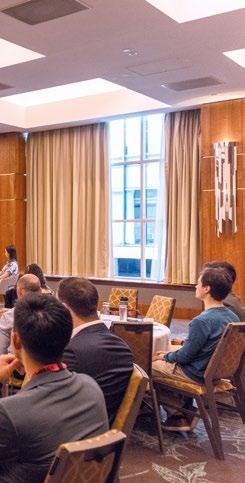
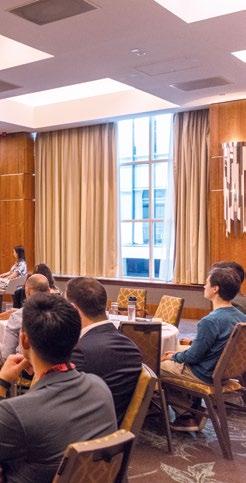
Let’s start with retention. One thing the panel agreed on was that creating the right company culture and employee experience is critical to retaining talent in the current environment. In my own experience as a multi-generational manager, and through my research leading up to the panel at the FIDI conference, the primary drivers to stay at a company across different generations differ. As a leader in your company, you have to be agile and able to adapt or you will not succeed in your retention goals.
For example, the Baby Boomer generation valued stability in a job, good standard benefits and, if lucky, a pension. Contrast that with Gen Z, who are looking to be part of something meaningful and make a difference through their work, while, at the same time, prioritising their work-life balance and life experiences above all else.
As a leader and manager in your company, how
do you manage this wide array of expectations simultaneously? Gordon and Christina summed it up nicely, recommending that the best way to achieve such a dynamic is to promote open communication among your team, up and down. Honest feedback goes a long way to promoting a healthy environment that benefits all generations.
Daniela also presented the idea of offering nontraditional benefits – I will call them ‘lifestyle benefits’. She listed a number of small and highly viable changes that most companies could incorporate easily into their business model, which would make the culture more approachable, specifically to the Millennial and Gen Z demographics.
Examples include a flexible employee arrival time (starting earlier or later depending on their personal priorities), giving employees a day off for their birthday, and, of course, offering a more flexible approach to the work day in general. Other lifestyle benefits that younger generations may value more than their Gen X and Boomer counterparts include childcare, pet insurance, and wellness benefits.
Retention needs to remain a priority among companies for long-term corporate sustainability, but I was struck by some of the feedback that the FIDI 39 Club has received in its Mentorship Programme.
We routinely ask participants how long they have been in the industry and how long they have been at their current company. I am constantly surprised that they are often at one company for all or the majority of their career. Maybe this means we are better at retaining than we think we are… so maybe the issue is not so much retention as attraction of new talent?
Steve Jordan had strong opinions on this topic, claiming we are shooting ourselves in the foot by constantly downplaying the industry and what it has to offer. He has a point – who would want to work for an industry that is always saying how ‘unsexy’ it is? Not me.
We have to keep in mind that the incoming generation have grown up with information at their fingertips their entire lives. They have been immersed in technology and can, and will, research companies to the greatest extent possible.
There is even more opportunity for open and honest online employee reviews than ever before. If we, as an organisation, are not cultivating the sort of corporate culture and employee experience that we would be comfortable being promoted honestly to the world, is it our fault if we fail to attract talent in this ever-evolving market?
I don’t have all the answers, but it is certainly an area that can be corrected with the proper steps and mindset, with a focus on building a brighter future for our industry.
Maybe we don’t use the term ‘Feed the Animals’ (I doubt that will help our aim of attracting or retaining talent), but the focus does need to be on nurturing our existing employees, our corporate cultures, and our overall means of recruiting fresh talent.
“We need to focus on nurturing existing employees and corporate cultures”
You can watch the full recording of the panel ‘Next-Gen Movers: how to build a young, resilient workforce on FIDI’s YouTube channel

As more businesses make improvements designed to protect the mental health of their employees, FIDI 39 Club Board member Sonja Tuomela speaks to movers about what prospective staff expect from their employers today



“There is no work without health and there is no health without mental-health awareness”
In today’s fast-paced world, the lines between work and personal life often blur, leaving many individuals grappling with the elusive concept of balance. Amid this juggling act, mental health emerges as a critical cornerstone, influencing our wellbeing, productivity and overall satisfaction.
As we delve into the intricate interplay between mental health and work-life balance, it becomes evident that fostering a harmonious balance is not a luxury, but a necessity – for individuals and for their companies.
One of the FIDI 39 Club’s goals is to address the stigma surrounding mental health in professional settings. We want to be advocating for a culture of openness, empathy and proactive support. By fostering a climate that prioritises psychological as well as physical wellbeing, organisations not only enhance employee morale and retention, but also foster creativity, innovation and sustainable growth.
With this goal in mind, the FIDI 39 Club hosted two online micro-events this spring, with a focus on mental health and wellness in the workplace. The sessions were led by talent management professional and mental health coach Christina Kasiraja-Lebrun.
These events took place in the lead-up to the annual FIDI Conference in Edinburgh, where the Club took another deep dive into the topic. Inspired by these, we have included several comments from our FIDI 39 Club members in this article. Gabriela Humeniuk, from Lift Van International Argentina, says: ‘There is no work without health and there is no health without mental-health awareness.’
We believe this industry is unique and that its people make it even better – at the industry level and within individual companies. The dedication of the people to their work and to this industry is hard to match. We are all different, and by talking about this topic we hope you can find new perspectives on mental health and self-care.
After attending one of our micro-events, Rebecca Krot, from Intermove Germany, says: ‘I knew fairly well what I needed for self-care before the sessions, but now, I feel I have adopted a different perspective. Instead of seeing my “quirks” as concessions to laziness, I now view them as active and necessary
contributions to keeping myself reliable and resilient for my employer and for me.’
With people the key component of this industry, we have new generations joining the workforce with fresh expectations of their work-life balance. It is important for companies to be aware of what these generations are looking for. As Rebecca points out, this is one of the first things she will look for in a possible employer, asking: ‘What is the company’s commitment to facilitate self-care and active interest in work-life balance?’
This balance is increasingly important for the younger generation when choosing a place of work. It means that, if companies want to retain talent, they need to look at their work culture and processes, and ensure their employees are thriving in this demanding industry.
We often expect our employees to be flexible to get the job done – but have we forgotten that this should be a two-way street?
This might be a revelation for some, but work should not be the most important value of our lives –and that can sometimes be hard to remember.
Laurynas Mandravickas, from Hasenkamp Germany, says: ‘In our industry, we could be working 24/7 and the work would still not be done. I find it important to spend time with my family; therefore, I have to prioritise my daily work accordingly’.
José Luis Tabuenca Rivera, from SIT Spain and newly elected FIDI 39 Club Board member, says: ‘I believe the key to leading a fulfilling and rewarding life, where we care for and love others better, is first to love and accept oneself. Above all, knowing oneself makes you almost invincible, as you set your own schedules, limits of effort and goals to improve each day.’
Of course, this issue doesn’t only sit on companies’ shoulders: we have individual responsibility to take care of ourselves. However, companies can and should play a key role by providing a framework for a healthy work culture and the opportunity for their employees to thrive in their jobs.
Key to a healthy work culture is realising we are only human. One of my favourites is trusting your team to take care of their responsibilities - and with this trust there should be freedom to find best practices for
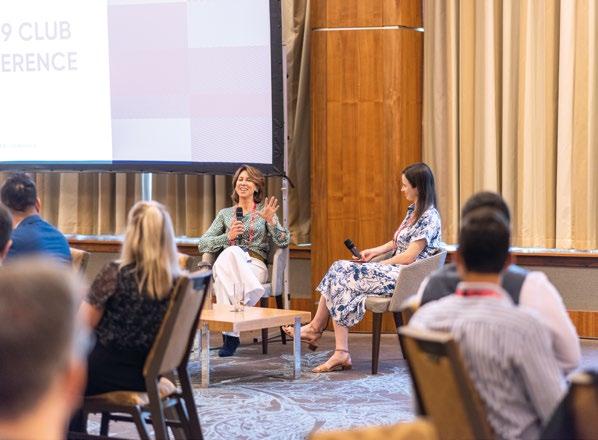
them, within company guidelines, of course.
Psychological and physical wellbeing go hand in hand. It is a well-researched fact that regular exerciseboth aerobic and resistance training - has great benefits for reducing anxiety, stress, and depression.
While not all stress is bad, there are many ways to deal with the ‘bad’ type of stress. Throughout the discussion at our micro-events, several participants mentioned sports and exercise as one of the main ways to maintain self-care and reduce stress.
For José Luis, sports play a pivotal role, and he aims to follow the 8/8/8 rule in his life: ‘8 hours of sleep, 8 hours of work, 8 hours of family, sports and leisure. This is what I strive to maintain to stay balanced and not to lose control.’
Laurynas has been inspired since the micro events to pick up jogging again, together with other sports such as tennis and riding a bicycle - and nice spring weather in Germany has given him an extra push.
Gabriela also mentions sports, alongside ‘singing, studying, cooking, and taking time every morning to appreciate life, to say thanks for being able to live another day and breathing calmly before getting up to deal with everything that my day might bring’.
Following Gabriela’s example on gratitude can make a world of a difference in our lives, with our stressful schedules and daily tasks.
Gratitude is another great stress relief, with short-term benefits being improvement of mood
and reduction of anxiety, and long term ones – when practised regularly – being changes in our brains, making us more grateful overall.
Together with gratitude, exercise, nutritious food and taking small breaks to stretch, move your body and de-stress during work can make a world of difference to your day.
The important thing to remember is that there is no magic trick, or one-size-fits-all way to manage our wellbeing and mental health. The issue is complex and there are as many variants of what works as there are people on this Earth of ours.
We hope that this article has given you some new ways to think about your overall health, work-life balance and wellbeing. These are quite basic tips we can all start to incorporate into our lives today, just a little step at a time.
Please remember that, if you struggle with this topic, there is absolutely no shame in seeking help from professionals. We hope that everyone will take responsibility for their own mental and physical health, but also help if we see someone around us struggling. Let’s respect each other and be human to human.
‘Mental health is either unimportant or urgent. By keeping working to change this mindset, everyone wins in the long term,’ says Rebecca Krot.
● For references, please see the FIDI Focus online version of this article.
“Work should not be the most important value of our lives –this might be a revelation for some”


We look at the key findings of the fifth independent assessment of the financial performance of FIDI’s membership, with comment by FIDI Secretary General Jesse van Sas
Introduced as a mandatory requirement in January 2019, the FAIM Financial Assessment has now been running for five consecutive years.
The fifth edition of the FAIM Financial Assessment report by EY analyses the creditworthiness of FIDI’s membership. It is based on the financial accounts of FIDI-affiliated companies collected in 2023 and looks at the trends of the past five years.
The key findings of the latest report include:
● In general, FIDI membership remains financially healthy and has a solid foundation.
● The percentage of FIDI Affiliates with a low creditrisk report is 89.5 per cent – the highest since the assessments started. The main reason for this is the healthy debt structure for the majority of Affiliates (78 per cent have a low solvency risk).
● Profitability has increased slightly in comparison with last year, but it remains an attention point. The operating profit ratio is still only 6 per cent –most industries’ companies are targeting at least 10 per cent, a threshold that only 24 per cent of the FIDI membership is able to meet.
● There has been a recovery in operating cash flow (liquidity), which has risen from 13 per cent to 18 per cent, back to pre-pandemic levels. However, liquidity risk remains an attention point and is directly impacted by the length of payment terms a company uses.

● The number of Affiliates in the most critical risk category (those with an EY CRB score of more than 95 per cent) has systematically decreased from 21 in 2020 to 11 in 2023. Most of these had a high-risk report (a score of more than 50 per cent) in the year before. These Affiliates have an issue with accumulated losses over the years, resulting in a very low, or even negative, own equity for almost all of them.

Secretary General Jesse van Sas says:
‘As we continue collecting financial data of our membership, we start seeing patterns and trends in the financial state of the moving companies within FIDI.
‘First, considering this mostly concerns audited financial figures of 2022, a post-COVID year, it is interesting to see how ratios are evolving – or not evolving at all. Despite the rather volatile conditions during 2022, with continued concerns about resources and global inflation, the overall financial health of the FIDI membership remained solid.
‘The increasing share of companies with “low credit risk” – which, at 89.5 per cent, is the highest since assessments began in 2018. That is a very good trend, and it is also the purpose of FIDI’s initiative to not only measure and benchmark financial health of our membership, but to also put membership consequences for those who cannot reach the minimum benchmark.
‘We want FIDI Affiliates to represent financial trustworthiness, making them more reliable partners for corporate and governmental customers, as well as direct consumers. But we are not there yet, as careful readers will detect that concerns remain – relatively low profitability in the moving industry, in particular. This remains an old sore in our line of business, and although it has gone up slightly in the past few years, a 6 per cent operating profit ratio is still not near what you can call comfortable.
‘Nevertheless, the improvement has helped the operating cash flow of our membership, which has increased by five percentage points. This is good, but still requires attention. The constant pressure from large corporate customers for extended payment terms will not relent, and is detrimental to these same customers, at times when there is a distinct shortage of resources, both in staff and transport.
‘To maintain these resources, movers had to pay their own supply chain quicker, while, at the same time, they were being pressured to accept longer payment terms from their long-term corporate customers. Hence, liquidity remains under immense pressure, and it requires courage to take a stand against these unreasonable demands.
‘This annual financial report shows FIDI Affiliates where their strengths are, but also their weaknesses. It is also useful for corporate customers, as it indicates how this important part of their supply chain is doing financially.
‘As we publish the fifth annual assessment of the financial health of FIDI-affiliated businesses, I invite you all to read it – you will learn a lot.’
● FIDI Affiliates can access the 2023 EY Financial Assessment on the publications section of fidi.org







Martin Sommer, General Manager, Wilhelm Rosebrock GmbH in Bremen, Germany, tells FIDI Focus why rejoining FIDI is an important development for his company

Wilhelm Rosebrock GmbH & Co. KG is a company of 120 people that can trace its history to the end of the 19th century, when founder Wilhelm Rosebrock ran a horse-drawn shuttle service from the port at Bremen.
Company stories can be complex. So, let’s make this one simple. In the 1930s, Martin Sommer’s grandfather joined the company and started the household goods moving service. Then, after World War II, Germany was left with 360,000 US troops stationed in the country –there was an obvious opportunity.
‘We were one of the first companies in Germany to work on the US military household goods contract,’ says Sommer. ‘We’ve been doing it ever since, gradually expanding to service practically all of Europe with our partners.’ After the Berlin Wall came down in 1989, the business decided to focus more on corporate and private moving.
When Sommer joined the company 20 years ago, Rosebrock expanded its expertise in domestic and international moving and the worldwide transportation of cargo; this was timely, as the number of US troops in Germany was diminishing. Making the change was a slow process, says Sommer. ‘We were like a large ocean ship taking time to change direction.’
Today, the team is building on that strategy – which is why FIDI membership matters.
Sommer has looked east, opening a branch in Warsaw in 2018, which has been successful. ‘It’s been a blessing,’ he says. ‘We have a team of 14 good people there and a strong available workforce that will support our expansion in Poland, processing general cargo shipments worldwide for our national and international customers.’
He is also very proud of Rosebrock’s expanding port operations in Bremerhaven. ‘Our new facility allowed us to grow our handling by roughly 300 40ft containers a month, with our own teams and equipment, very quickly. We’d like to do more if we can. It’s really working well for us.’ The next step was Rosebrock’s compound becoming an official custom-bonded area in January 2024.

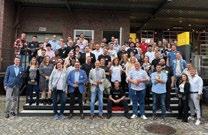
These developments have helped to grow Rosebrock’s domestic and international moving business and have led to FIDI membership. Today, the company handles all facets of international moving for partners and customers worldwide.
So, in this competitive market, what makes Rosebrock special?
‘It’s our team,’ Sommer says. ‘We have the skill and the knowledge to handle every kind of shipment worldwide with our own resources. We can book cargo ourselves – ocean freight, air freight or a truck – we don’t have to use brokers. Even the customs clearance in and out of the EU is handled by one of our teams. The expertise and qualifications are all in-house. We also have a strong network of partners.’ And it is when problems arise that the Rosebrock experience really shines. ‘It’s when things get tough that we have the opportunity to show how good we are.’
Rosebrock has been a FIDI member before, but when FAIM was introduced, the previous management didn’t see the need to be certified. ‘It wasn’t their way of doing business,’ says Martin.
Becoming FIDI-certified again has been a long journey that started with getting various ISO certificates. How does Sommer feel now the process is complete? ‘It’s very satisfying for everybody,’ he says. ‘To pass the first-time audit with no non-conformities shows the dedication of the people involved. We really wanted to be part of the FIDI family again and join some of the best companies in our industry.’
Rosebrock attended the FIDI Conference in Edinburgh with three of his team, including representation in the FIDI 39 Club. Sommer is keen to get more involved with FIDI, but recognises that, as a newcomer, he needs to sit back and watch first. Everyone in the company is excited to become part of the FIDI family. ‘We are a strong team and we are proud of our history,’ he says. ‘You can rely on us.’
A FIDI Focus session at the 2024 FIDI Conference heard sage advice on digitalisation from Shipeezi founder and CEO Carlos Ferri – who also marked the occasion by announcing the launch of Shipeezi Community, a free online web system designed to help moving companies transition from paper-based and spreadsheet systems
During the 2024 FIDI Conference in Edinburgh, Shipeezi founder and CEO Carlos Ferri took part in a FIDI Focus Fringe session: Advice for digitalising your business (youtu.be/hhkezxkv3tE ). Hosted by FIDI Focus Editor Dominic Weaver, the wellattended event examined the status of digital take-up in the international moving industry, the challenges businesses face as they upgrade from analogue to technology-based systems, and the operational and cost gains they get from doing this. During a discussion of the potential for AI applications to drive efficiencies, Ferri gave the audience of delegates practical tips for doing better business with technology.
The session heard that, for all the progress made in taking on digital technologies, there is a still a significant proportion of movers who lack in this area.
Ferri explained that ditching paper didn’t simply mean using Excel spreadsheets and email. ‘We envision a future where every moving company has access to a unified, secure, and online move file-management base,’ he said. ‘This means authorised partners can access information seamlessly, anytime, anywhere –a vision we’re calling #80to802026, aiming to bridge the gap from the 80 per cent that lacks digitalisation to 80 per cent digital within the next 24 months.’
Digitalisation empowers businesses to reach new heights in the following ways:
z Streamlining workflows: eliminating repetitive tasks, improving process efficiencies, and reducing errors
z Automating tasks: freeing up your team to focus on more strategic initiatives
z Data-driven decision-making: gaining valuable insights from real-time data to make informed decisions
z Enhanced customer experience: providing your customers with 24/7 access to information and improved communication.

Shipeezi Community is designed for moving companies to transition to a free online web system, that also offers multiple plug-ins that can be later acquired to enhance your experience. It offers a secure, web-based platform to consolidate all your move files with pertinent information. This allows anyone in your company to access this information easily, anytime, anywhere.
z Digital file management: manage all your move files, including quotes, orders, and shipments
z Master list: maintain a consolidated view of all your orders, quotes, and shipments
z Information access: easily access all relevant information for each move file
z Quote creation: generate estimates directly within the system
z Document management: upload and store essential documents for each file
z Integrated tools: leverage Google Maps and Street View for optimised routing
z Automated communication: use automated email templates to streamline communication
z Customer and agent management: create and manage customer and agent databases
z Customisation: adapt the platform to fit your specific needs
z Basic reporting: gain insights through basic dashboard reports
z Sleek user interface: enjoy a userfriendly and easy-to-manage interface
z Customer portal: offer your customers a self-service portal to view quotes, manage orders, access inventory details, and track shipments.
Shipeezi Community provides a seamless onboarding experience with self-service configuration.
Why does digitalisation come before standardisation?
Legacy systems and paper-based processes create data silos, making it difficult to gather and analyse information from different parts of the operation. Digitalisation creates a central platform where data can be integrated and standardised later.
Businesses have unique needs and processes, and digitalisation allows companies to automate and streamline their specific workflows before standardising across the industry. This ensures the standardised processes actually reflect real-world practices.
The moving industry can vary greatly depending on location and client needs.
Digitalisation allows companies to adapt their systems to different situations before standardising processes that might not apply universally. So, while standardisation is the ultimate goal for optimal efficiency, digitalisation is the necessary first step to create a foundation for a unified and standardised system.




FIDI Focus speaks to trainers who have recently joined the FIDI Academy about their first Train the Trainers event, which was held
in Belgium earlier this year
Every two years FIDI’s Academy runs a Train the Trainers (TTT) event designed to review and develop the courses it offers. The latest of these was a three-day event that took place at the Landgoed Altenbroek Hotel in Belgium in March, with some of the newest additions to the training team in attendance. Here are their impressions.
The TTT event was a great opportunity for our globally diverse and experienced group of trainers to meet and bond with each other in a single location and was high on energy from start to finish. It is run professionally and effectively by Academy Manager Chantal Fera and the FIDI office.
It is amazing to see the enthusiasm and dedication that every one of our trainers has and their sheer passion for the moving industry.
Sharing our training experiences is incredibly important and this gives us the foundations for where we want to develop the Academy’s offering into the future. We put ourselves in the hot seat, aiming to truly understand what parts of the course are effective and those that need an overhaul.
The FIDI office had collected feedback from students and Academy users over several years, which guided us in our mission. We went through all the courses microscopically, doing away with material we consider to be out of date and introducing more relevant and up-todate content.
Whether you have just carried out your first training or have been doing this for the past 20 years, everyone’s input, opinions, and suggestions matter.
During the event, we also finalised content for the new sales programme, which I am sure will be a sell-out, and discussed the need for educating our members about generic topics such as IT and finance – and how FIDI can support its members in these areas.
Having listened to the other trainers’ experiences and learning from each other’s mistakes and triumphs, I came out of this event confident and rejuvenated, and the bonding was so great. Even though we were discussing serious course materials and industry trends, we had fun along the way, too.
Professionally, it gave me the opportunity to interact closely with industry stalwarts and to learn so much about how your own culture and experiences shape you as a trainer – which is one of the reasons that makes the Academy so great.
The final day’s session included a workshop by Boom Chicago that allowed us to channel our inner Elizabeth
Taylor, with voice modulation, body language, impromptu sales pitching, and other exercises. This helped us improve our delivery skills as trainers and gave us tips for our own sessions. In this workshop, we were the students – and it was really well received.
The TTT was fabulous – much needed and invigorating. We’ve all been colleagues and conference friends for several years but to come together for a common purpose and to achieve goals that the Academy had set for us, was a really enriching and rewarding experience.
It was great to meet the team before delivering my first session. I was really impressed by the level of professionalism and commitment – and the amount of work that goes on behind the scenes at the FIDI Academy to get a top-class project with real benefits for the industry.
It was great to feel the engagement and teamwork during these intensive three days – and the work will really help raise the bar for the industry.
While the whole event was useful, my highlights were the teamwork the group showed in revamping the training sessions in detail; how we challenged ourselves to develop our teaching techniques; and the brainstorming that help us define what the industry really needs.
It was a privilege to share this event with this great group of people and make new friends. The experience helped me understand that the Academy is a living, breathing entity, full of energy and fully equipped to help the industry during these challenging times.
Angelo Lepore
I am a recent addition to the FIDI Academy team, so it was important for me to attend this event.
My expectations were exceeded early on – the energy and commitment of everyone involved in this is evident from the moment I arrived and throughout the programme.
Of the many sessions we had, I particularly enjoyed working on the content of the MiM2 programme, where we used student feedback to reinvent current content and create relevant new parts.
For me, the goal of attending industry workshops is to come away with more knowledge and additional tools; we achieved both, progressing the Academy’s programme and, with the help of our guest speaker, bring amazing new ideas on communicating well, too.
I am really looking forward to bring these updates into FIDI Academy classrooms this autumn.
Pauline Collins
The TTT event gave us the opportunity to spend time with and learn from more experienced trainers and focus on our Academy roles away from day-to-day distractions. It gave me an insight into the commitment of FIDI and the
training team and the importance of the FIDI Academy for our industry.
To see my own passion for the industry reflected in the other trainers was a highlight for me.
It was a huge benefit to spend dedicated time with my fellow EIM trainers. While these training weeks are intense, it is important that we trainers get to know each other in advance, so we have a better understanding of our skill sets, allowing us to plan our training weeks to the best advantage of our students.
We had all been allocated pre-TTT week tasks – this formed the basis of our module review. Of course, we can’t achieve everything in one week, so we left with homework and deadline dates for completion, too.
We shared ideas and insights into our businesses and our differing approaches to situations. I took away some good ideas to implement and feedback on my training style, with tips and tricks to improve.
After the TTT week, the EiM team have set up regular calls, so we can be in contact throughout the year and keep focused on our allocated tasks, and build on the connections and friendships we have made. We all knew each other before from our working lives – but the Academy connection is really special.
The TTT event was fantastic, allowing me to delve deeper into the EiM programme syllabus and structure alongside other trainers. The collaborative environment was invaluable for ensuring consistency and effectiveness in delivering the course.
The week flew by and the camaraderie among the trainers’ team was fantastic – everyone was open to learning from each other’s experiences. The communication skills workshop was particularly insightful, and the session with Boom Chicago was truly inspiring.
On a personal level, the event boosted my confidence to deliver the EiM. Professionally, I gained a wealth of knowledge and new approaches to enhance my training
style and effectiveness.
The TTT was well organised and a credit to FIDI’s commitment to delivering top-notch training programmes. We had a refreshing daily hike after lunch and amazing food. However, the location – in a very remote part of Belgium – meant the trainers had no other distractions to tempt us away from our work.
I had a great experience on this, my first TTT, and I was very excited to understand how it all worked. It was great to get to know the other instructors and to improve myself by learning about their best practices. I learnt something every day.
Connecting, sharing meals, and generally getting to know each other allowed us to understand how we could work better as a team, and draw on each other’s strengths and profiles. The new ideas we gained were invaluable, too.
I learned what I can contribute personally, and what others bring to the table – and I gained insights into how to pass on the new content we developed to the students better.
Robert Cormier
I attended the FIDI Train the Trainers event to enhance my skills and collaborate with esteemed industry leaders. The experience was incredibly enriching, fostering a strong sense of teamwork among us trainers and, over the three days, we meticulously reviewed and refined our current programme.
The event was a profound growth opportunity for me, strengthening my training capabilities and deepening my industry connections, while professionally, it reaffirmed my commitment to excellence in household goods moving training.
The successful DSP seminar I recently helped deliver received positive feedback, marking a significant achievement for both FIDI and my own professional journey.
By Chantal Fera, FIDI Academy Manager

The FIDI Academy has pledged to incorporate practical strategies managers can use to support their employees’ mental health. This is because poor managers, who lack key people management skills can have a very negative effect on the mental health, job satisfaction and performance of the people they manage.
As a constant presence in the lives of their employees, managers can have a more profound impact on staff’s mental health than doctors or therapists, and those who ‘do things
right’ can help mitigate against the detrimental impact of excessive workloads and stress.
Research demonstrates the impact of supervisor and manager training in employee wellness, too. According to a recent survey, 42 per cent of global employees have experienced a decline in their mental health since the pandemic began. So, what can managers do to support their team members stressful times?
The FIDI Academy’s MiM² programme will now include a focus on two key areas:
1. Mental health practices for yourself
2. What a company/managers can do to promote positive mental health in the workplace



We have based the part of the programme on NSDR (non-sleep deep rest) or yogic sleep methodology, suggesting eight concrete actions managers and leaders can take today to improve their staff’s mental health in the face of unprecedented uncertainty. These include expressing their own vulnerability, modelling healthy behaviours, and building a culture of communication.
The protocol will enhance the learning process by reducing day-time fatigue and improving focus. It can also greatly enhance your sleep and mood, and promote neuroplasticity– the ability of your brain to change and grow.
FIDI’s new Corporate Sales Programme has been developed with and will be delivered by our business partner Carver Consulting, an organisation with many years’ experience in the field of sales training.
The programme will cover the challenges of the moving and relocation industry and the complexity of its stakeholders. It offers a strategic approach to sales but also tangible value, professional tools and methodologies, that will help participants be more successful in winning clients.
Participants will go home with innovative approaches, skills, and the tools to increase revenue for their businesses.
Format:
The programme is a blend of online and face-to-face training. Offered on a modular basis, we are allowing participants to sign up for the entire programme or a few workshops only.
Online workshops:
1. Sales presentations to clients
● How to make effective sales presentations that are designed to win clients.
● Developing skills to win over decision-makers and convince an audience through sales presentations.
2. How to negotiate with difficult clients
● How to maximise opportunities and minimise dangers that clients create during negotiation, including tools for steering a negotiation successfully.
3. Handling objections from clients
● How to handle situations where clients have uncertainties or objections to the quality or necessity of services – and achieving a positive outcome.
4. Price handling
● When to communicate.
● How to minimise negotiation from the partner.
● How to negotiate if needed.
Classroom workshops:
1. Classic sales skills and methods (three days)
● Presentation or negotiation depending on the make-up and focus of the group (agreed with participants in advance)
● Exploring the partner’s situation
● Presenting benefits
● Handling objections
● Communicating on price and agreements
2. Key account management (three days)
● Key account strategy
● Establishing a client database
● Sales analysis
● Strategic planning
● Key account management negotiations
Participants will have the opportunity to reflect on their real experiences in the field and/or market specific challenges and discuss them with their trainer.





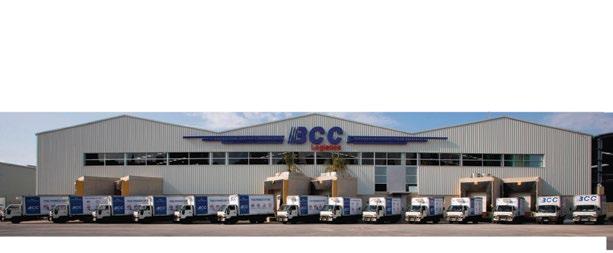
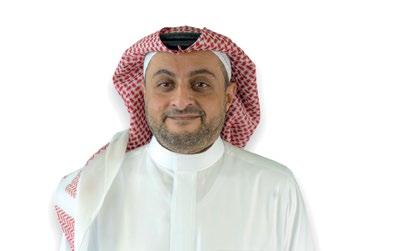
As Saudi Arabia implements its ‘Vision 2030’ diversification plan, opportunities are opening up for new sectors, including moving businesses. FIDI Focus meets Nizar Al Mani, CEO, Four Winds Saudi Arabia Limited, to find out about the company’s development and his own relocation journey
FIDI Focus: Please give us your background and career highlights so far.
Nizar Al Mani: I was born in Jeddah, Saudi Arabia. After finishing my degree in business administration from King Saud University in 2000, I earned my MBA from Portland State University, in the US, in 2004.
My career in the family business started early. I was a fax operator during summer vacations and school breaks. It was a humble beginning, but it sparked my interest in the business world.
In 2002, I broadened my experience with a marketing internship at Intel Corp. Fast forward to 2006 – I joined Four Winds full-time. I started as a marketing manager and, in 2007, I helped develop our logistics unit. In 2012, I started our Four Winds Pharmaceutical Logistics business and, in 2014, I was promoted as a VP to the company. In 2017, I earned the family trust and started to head up the group as CEO.
FF: When and how was Four Winds founded, and how has the company developed over time?
NAM: It was founded in 1979 as a JV with Mohammed Al Mani, the founder of Four Winds Saudi Arabia and Four Winds International, which used to be based in San Diego,
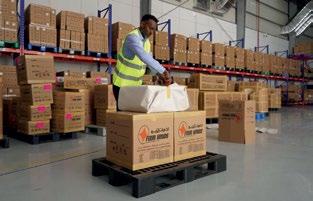
US. Since the beginning, Four Winds Saudi Arabia has always striven to provide high quality comprehensive and integrated moving and relocation services.
In 1990, Four Winds Saudi Arabia became 100 per cent owned by the Al Mani family. After this, we expanded our services to cover nine cities across Saudi Arabia and the Kingdom of Bahrain.
The company began by providing transportation services to diplomats, VIPs, and residents in Saudi Arabia and abroad. Because of the high demand for its services, Four Winds expanded the business to become one of the country’s most prominent logistics companies in the early 1980s.
Notable projects span sectors including oil refineries, water desalination, telecommunications, energy, electricity, and petrochemicals. Four Winds is active in the diplomatic sector, too.
Today, we are a trusted leader in the field, respected throughout Saudi Arabia and Bahrain; and our commitment to quality and customer satisfaction is reflected by membership of international organisations including IATA, FIATA, IAM, and FIDI.
Four Winds’ partnerships and strong relationships in international markets allow it to provide logistics services to clients anywhere in the world. The company can handle a wide range of cargo, including antiques and artwork, live-event equipment, personal belongings, medicine, general cargo, perishable goods, and hazardous materials.
Logistics services include domestic and international transportation, furniture relocation, warehousing, supply chain management, customs clearance, packaging, cold storage, and international air and sea freight. We also cater for industries such as project management, engineering and construction, exhibitions and events,
“The economy is being opened up to new sectors, including tourism, sports, mining, and manufacturing electric vehicles”

oil and gas refineries, general industries, large-scale projects, healthcare, technology and renewable energy, military, food, and hospitality.
FF: What is your management style – and how does your approach reflect on the company’s operations?
NAM: Customers move their personal items because they hold great value, and often have sentimental memories attached. Four Winds believes in fostering a collaborative and empowering work environment.
My leadership style focuses on open communication, where every member of the team feels comfortable sharing ideas and taking ownership of their work.
This approach is reflected in everything we do, from the way we develop customer service programmes to how we handle complex logistics projects. It’s all about building a strong team culture where everyone feels valued and contributes to our success.
FF: It’s a time of great change for Saudi Arabia. What is happening in the country that will impact on the moving business?
NAM: We are working hard as a nation within Vision 2030* to diversify the Saudi economy away from reliance on oil. The economy is being opened up to new sectors, including tourism, sports, mining, and manufacturing electric vehicles.
This means Saudi is open for business and many expert expats are flowing into the country. Four Winds is creating new products that fit the needs of the new economy.

FF: What are your goals for the business?
NAM: We’re seeing healthy growth at Four Winds. Our goal is to become the most integrated logistics partner for our clients. For the future, we’re focusing on serving more clients and leveraging new technologies such as artificial intelligence and Internet of Things to improve the customer experience across all our services, from surveying and pricing to moving and storage.
We also have a new management team leading the moving division, headed by Rasheed Ali. We’re optimistic about the future.
FF: Where do you see the company 10 years from now?
NAM: I’m excited about the future of the Saudi market. There are a lot of great opportunities emerging, and we’re committed to developing innovative new products and bringing them to market every year.
Saudi Arabia’s Vision 2030 is a government programme launched for the economic, social, and cultural diversification of the country. The initiative is particularly concerned with increasing the contribution of non-oil sectors such as renewable energy, tourism, entertainment, and other industries.
In an article written at the start of 2023, Stuart Jackson – then of Sterling Lexicon –argued that stopping HHG shipments did not necessarily make global mobility more sustainable. After another year of volatility, he asks if we should review this view

Just over a year ago, I wrote an opinion piece for FIDI Focus on behalf of Sterling Lexicon, titled ‘Does ending HHG shipping really make global mobility programmes more sustainable?’
The thrust of the piece was that many of the parts supporting a globally mobile workforce have a detrimental impact on the environment, and global mobility professionals need to look at their programmes holistically and in a balanced way. Household goods (HHG) shipping, I argued, is only one component of a relocation support package and not the most damaging to the environment.
A year on, I have been reflecting on whether my argument is still valid. In a VUCA (volatile, uncertain, complex, ambiguous) environment, the world has changed. While war still rages in Ukraine, the emergence of drought in the Panama Canal and conflict in the Red Sea have impacted global shipping and brought the question of sustainability back into focus.
somewhat since. Even routes that do not pass through the Suez Canal, such as Asia to the US west coast, have been impacted, with rates increasing by 162 per cent.
Much of the cost of diverting ships around the Cape of Good Hope is attributable to additional fuel costs, which add roughly an additional £1m per container ship. The extended journey increases fuel consumption, which, in turn, has a detrimental impact on the environment.
According to Alan Murphy, CEO of SeaIntelligence, the rerouting will result in an estimated additional 134 billion TEU (20ft container) miles compared with 2023 – a 16 per cent increase. Moreover, Murphy points out that it is likely that vessels will travel faster to maintain capacity. According to Sea-Intelligence’s calculations, a 1 knot increase in speed, from 16 to 17 knots, increases emissions by 14 per cent.
“To compare the carbon cost of shipping and a furniture allowance fairly, we should understand the impact of manufacturing new furniture”
Since early 2023, Panama has been in the grip of a prolonged drought. In October 2023, rainfall was 43 per cent lower than average levels, making it the driest October since the 1950s. As a result, transits through the Panama Canal are 36 per cent lower than one year ago and 62 per cent lower than two years ago. According to the Peterson Institute, warming ocean temperatures and dry conditions have affected the canal. It also links deforestation of the Amazon to the drought.
Houthi attacks on shipping passing through the Red Sea have resulted in 90 per cent of container ships being directed away from the Suez Canal. To put this into context, around 30 per cent of global container trade passes through the Suez Canal.
Ships destined for Europe are being diverted away from the Red Sea and the Suez Canal around South Africa’s Cape of Good Hope, adding an additional 4,000 miles to the journey, and increasing transit times from roughly 16 days to 32. As a result, shipping prices have jumped, with Asia-to-Europe rates peaking at around five times their pre-crisis level in mid-January, but softening
Murphy also highlights that, with capacity in mind, shipping lines are likely to deploy smaller, less fuel-efficient vessels. The combined effect, Sea-Intelligence calculates, could lead to CO2 emissions increases of 260 per cent to North Europe and 354 per cent to the Mediterranean. Applying these percentage uplifts to Freightos’ CO2 calculator, to show the impact of moving a 20ft container, is quite startling, as this table illustrates:
To give this some further context, I stated in my original article that flying from London to New York and back generates around 2,863 kg CO2e
So, given the dramatic increase in CO2e resulting from the geopolitical crisis in the Middle East, should we draw a different conclusion today from last year? Would global mobility policies be improved, at least from a sustainability perspective, by eliminating a provision for HHG shipping and

offering a furniture allowance in its place? The simple answer is no.
In my article last year, I argued that to make a fair comparison between the carbon cost of shipping and that of a furniture allowance, it is necessary to understand the impact of manufacturing new furniture. I quoted a report conducted by My Tool Shed, which suggests the average piece of furniture generates approximately 47kg CO2e, although household appliances average out at around 240kg CO2e. Consider that a basket of goods included in a furniture allowance – covering categories including furniture, large and small appliances, textiles, and kitchenware – contains around 60 items for a two-bedroom apartment.
Using a rough calculation, we could reasonably estimate this to generate a CO2e footprint of 2,820kg – greater than the cost of divertedshipping a 20ft container from Shanghai to London, and only marginally lower than shipping the same from Shanghai to Genoa. This is a very rough calculation, but it provides some perspective and allows global mobility – and, potentially, a relocating employee – to make a more informed choice about whether to ship existing furniture or buy it new at destination..
As organisations seek to strengthen their sustainability credentials, some pioneers are looking to incentivise relocating employees who select eco-friendly relocation support options. Providing an oversight of the environmental impact of these options could help nudge employees towards making more sustainable choices.
Given that there is a credible argument that HHG shipments compare favourably with a furniture allowance from a sustainability perspective, I am still convinced that there are other areas of policy management where global mobility can achieve greater impact in reducing the carbon footprint of its programmes.
As an adviser to the business and an enabler of workforce mobility, the industry has a role to play in advocating less carbon-intensive approaches. Certainly, commuter assignments and hybrid short-term assignments (where an employee supplements international remote working with frequent business trips), need to be assessed for their carbon impact and compared with other options that might suitably meet the requirements of the business.
With air travel being the most carbon-intensive factor in mobility, policies should be designed to minimise this impact. This might mean providing incentives for assignees not to take home leave, or simply eliminating this benefit from policies. Focusing services on sustainability is equally a nearterm goal that global mobility can attain. Use of virtual service products for cultural and language training is commonplace.
Settling-in services can prescriptively emphasise guidance on sustainable citizenship in the host location – advocating use of public transport and cycling where appropriate, and providing specific information around recycling, composting, and so on. Orientation and home-finding services can be provided virtually, and a good RMC can support by refining these offerings in a way that maintains a high-quality service to the employee.
So, we continue to live in a VUCA world. Crises are temporary in nature, meaning that cost – both in monetary and carbon terms – eventually graduates back towards the norm. However, recent history has shown that the next crisis is often just around the corner.
Global mobility has proven itself adept at navigating this new and unpredictable environment. Policy approaches should remain flexible to manage future crises, but should equally be designed thoughtfully and holistically, while adopting an evidence-based approach.
Around the world, environmental pressures, cybersecurity risks and geopolitical tensions are on the up, increasing uncertainty in the international shipping business. Jacob Dolan, Business Development Executive at Reason Global insurance brokers, explains why supply chain partners working more closely together in innovative ways is vital to reducing these pressures

The shipping industry, a cornerstone of global commerce, stands at a critical crossroads, facing an unprecedented array of challenges that test its resilience and adaptability. In an era marked by rapid environmental shifts, geopolitical tensions and technological advancements, the maritime sector finds itself navigating turbulent waters, literally and figuratively.
At the forefront of these challenges is the spectre of climate change, which casts a long shadow over maritime operations. Rising sea levels, increasingly severe weather patterns and shifting ocean currents pose significant risks to vessels travelling the world’s waterways. The threat of ships running aground because of unforeseen hazards emphasises the urgent need for enhanced safety measures and navigational protocols. Moreover, the environmental impact of shipping emissions looms large, prompting calls for greener, more sustainable practices across the industry.
In addition to environmental concerns, piracy remains a persistent threat, particularly in regions notorious for maritime crime. Armed attacks, hijackings and cargo thefts continue to disrupt trade routes, endangering the lives of seafarers and inflating insurance premiums for shipowners. Efforts to combat piracy through international cooperation and enhanced security measures have yielded some success, but remain an ongoing challenge for the maritime community.
In the Red Sea, Houthi rebels have begun an increasingly serious campaign of attacks against shipping vessels to protest against the war in Gaza and disrupt economic activity. To avoid this danger, shipping lines have rerouted around the Horn of Africa and the Cape of Good Hope, causing major delays and increased costs.
All of this has thrown up challenges to the insurance industry in trying to ensure the best cover possible for shippers looking to deliver for their customers.
The advent of the COVID-19 pandemic in 2020 sent shockwaves through the global economy, with far-reaching implications for the shipping industry. Nationwide lockdowns, travel restrictions
and supply chain disruptions brought about a domino effect, leading to container shortages, port congestion and skyrocketing freight rates. The resulting strain on logistics networks laid bare the industry’s vulnerabilities, prompting calls for greater resilience and contingency planning in the face of future crises. The after-effects of the pandemic are still visible, as the global demand for containers increases, and supply struggles to keep pace.
The world-changing events of the pandemic coincided with a hardening insurance market characterised by reduced capacity and increasing rates. As the world grapples with the fallout, geopolitical tensions further complicate matters for the shipping and insurance industries.
Strategic chokepoints, such as the Suez Canal and the Gulf of Aden, serve as vital arteries for global trade, making them prime targets for geopolitical manoeuvring and potential conflicts. Escalating tensions relating to territorial disputes, and regional conflicts all contribute to an atmosphere of uncertainty, prompting shipping companies and insurers to reassess their risk exposure and contingency plans. As a result, companies are seeing their freight costs increasing exponentially, In the past six months alone, prices for freight containers from Asia to the US have doubled. Alongside these challenges, insurance and re-insurance costs have risen significantly, affecting premiums for firms across the globe.
Infrastructure strains add another layer of complexity to the maritime landscape, with ageing ports, congested waterways and inadequate facilities impeding the flow of goods and hampering efficiency. The Panama Canal, a linchpin of international trade, has faced challenges in recent years because of low water levels caused by drought and climate change, leading to operational disruptions and delays. Similarly, ports around the world struggle to keep pace with the ever-growing size of container ships and the escalating volume of global trade, exacerbating congestion and logistical bottlenecks.
Amid these challenges, cyber risks loom large as the industry becomes increasingly reliant on

digital technologies and interconnected systems. Cyberattacks targeting maritime infrastructure, such as port facilities and shipping networks, pose a significant threat to operational continuity and data security. The need for robust cybersecurity measures and incident-response protocols is paramount to safeguarding the integrity of maritime operations in an increasingly digitalised world.
Despite these risks, a recent report – by law firm HFW and maritime cybersecurity specialist CyberOwl – states that a large percentage of the shipping industry does not have cyber insurance, with the average cost of an attack upwards of $150,000. While there has been an increase in the number of companies looking for cyber insurance cover, it is still a small percentage of the industry, in what is a relatively young risk market.
Continuing with the theme of insurance that responds to modern-day risks, there is a rise in ‘general average’ claims. While the declaration of general average was previously rare, it has been more common since the turn of the century.
The costs that are redistributed following a declaration can be significant and could, potentially, affect cargo owners, including the refusal to release goods until the owner accepts responsibility and any associated costs. Marine insurance provided by shippers should include cover for where general average is declared.
For general average to be declared properly by the ship’s owners/master there must be: an event, beyond the ship owner’s control, that imperils the entire venture; a voluntary sacrifice; and something saved. The ‘sacrifice’ might be the jettison of certain cargo, the use of tugs or salvors, or damage to the ship.
General average requires all parties concerned in the maritime venture (hull/cargo/freight/
bunckers) to contribute to make good the ‘sacrifice’; they share the expense in proportion to the value at risk in the venture. The incident involving the Ever Given getting stuck in the Suez Canal serves as a prime example of such an event. Resolving these general average claims spans years, potentially, and may impose significant financial burdens on the parties involved.
Another recent example that made the headlines was the Baltimore Bridge disaster, when the Dali lost control and collided with the bridge, resulting in its collapse and up to $4bn in damage. The process to declare general average has been announced recently and all cargo owners with goods on board will, potentially, share in the financial repercussions of the incident. It is paramount that shippers understand how marine insurance policies they have in place respond to these events.
In light of these challenges, the shipping industry stands at a pivotal moment in its evolution, poised to embrace innovation and transformative change. From autonomous vessels and blockchain technology to green propulsion systems and alternative fuels, the sector is ripe for reinvention.
The shipping and insurance industries face a multitude of challenges on increasing fronts, from environmental pressures and geopolitical uncertainties to infrastructure strains and cyber risks. As the shipping industry charts its course forward, embracing innovation, collaboration and responsible stewardship will be key to overcoming these challenges and realising its full potential in the 21st-century global economy. The insurance industries must do the same, ensuring appropriate cover exists at competitive rates for the shipping industry wherever possible.
These challenges will be conquered, but doing so requires constant innovation and planning from all involved.
“Embracing innovation, collaboration and responsible stewardship will be key to the shipping industry overcoming its challenges”

Miriam Acedo has rejoined Inters as Business Development Manager.
She first joined the Barcelona-based company in 2011, working for eight years in the International Department, and becoming International Business and Quality Manager. The company said that, after more than five years away from the industry, Acedo is ‘back home, full of energy and excited to face new challenges and develop new projects in Inters’.

HR executive Linda Herbert has joined JK Moving Services as Vice President, Talent Development. She will lead training and talent development for JK Moving and its sister company, CapRelo, a global employee relocation and assignment management firm serving corporate and public sector clients.

Brytor International Moving has announced a significant transition within its leadership team.
After a 50-year career in the moving industry, Mark Thompson (pictured, left) is retiring, having most recently held the position of General Manager for Guardian Transfer & Storage, and successfully founded Brytor’s Halifax branch.
Dan Ferguson (right) takes on the role of General Manager for the Atlantic region of Canada.


Ruth Lyons has joined Gerson Relocation as Sales Director for the UK. She will collaborate with the company’s global mobility and HR teams to help tackle their employee relocation challenges, with a focus on offering tailored solutions that maximise employees’ experience.
Meanwhile, Rula Costa-Rising has been recruited as Business Development Manager. She re-joins the company she left in 2011, after roles with Anglo Pacific, PSS International and almost a decade with Santa Fe Relocation in London, in a business development position.


Frédérique Harbison, who has led and developed Grospiron sales in recent years, will expand her role as Chief Commercial Officer (CCO) and oversee sales development for the moving and relocation business.
Group Managing Director Philippe Mirault said: ‘Frédérique is a hardworking and highly talented individual, whose continued dedication to growing our sales has been a tremendous asset to our group.
‘Her understanding of international mobility, and her ability to build longlasting relationships with our clients,
Invictus Relocation in Portugal has taken on Luis Amorim as Supply Chain Efficiency Manager.
He will be focused on optimising the company’s supply chain, enhancing operational efficiencies and upholding the quality of services to clients.
Fábio Manuel, Founder and CEO, said: ‘In his new role at Invictus Relocation, Luis will be spearheading initiatives to optimise our supply chain, enhance operational efficiencies, and ensure that we continue to provide top-tier services to our clients.
‘His vision is to streamline our processes in a way that not only improves our operational capabilities, but also elevates the overall client experience.’
will undoubtedly help drive the growth of our group.’
Meanwhile, Jean Christophe Cardot (JC) has been appointed Group Chief Operating Officer at Grospiron and CSU, overseeing all moving and relocation operations, and responsible for quality, efficiency and collaboration between all companies and departments.
Mirault said: ‘I have been working with JC for many years and am confident that, with his input, we will continue to shape the future and meet the challenges of our everchanging industry.’

Enrico Frigo, who was formerly CEO of Bolliger Milan, died in April at the age of 85.
Bolliger issued a statement ‘to honour his life, his work, and his enduring impact on the business world’.
‘Enrico was an iconic figure in the moving industry, with a career marked by successes and innovations. Through his visionary leadership, he established and guided the company of Bolliger Milan since 1973, to new heights of excellence, inspiring not only his colleagues, but also future generations of entrepreneurs. Even after retirement, in 2018, he remained connected to the company that still today benefits from his knowledge and implements his teachings.
‘During his tenure, Bolliger Milan achieved remarkable milestones, thanks to Enrico’s determination and enlightened guidance. Among this, the pioneering choice of joining the FIDI Community in the late 70s.
‘In 2015, at the Sirva-Allied International Convention in La Jolla, California, Enrico was awarded the prestigious and well-deserved President’s Award.
‘Beyond his professional achievements, Enrico was also a compassionate, respected, and esteemed figure internationally.
A demonstration of this is the wave of affection that has come from those who knew him, friends, and partners all over the world with whom Enrico has worked and collaborated through the years, sharing a lot of valuable moments during conventions and international events.’
Other tributes to Enrico have come from across the industry.
‘The Maestro of the Italian international moving industry. A giant of a man and a giant of a friend. I am heartbroken,’ said Mark Oakeshott, CEO of Mark Oakeshott Consulting.

Thomas Coupat, Country Manager China at AGS Four Winds Shanghai, said: ‘Enrico was one of the first people I was in contact with in the agent world when I started as a surveyor in Beijing over 20 years ago. At that time, I was new to this business and didn’t realise that this is an industry where great companies are built by people who care about each and every customer.
‘Even though, in the end, I had limited contact, he was for many years a name that many of us associated with immediately when we had a client telling us “I am moving to Italy”. For many of us, it meant that Enrico and Bolliger would take care of it. Not a bad legacy.’

Jerry Delzio, Global Sales Executive at Suddath Relocation Systems of New York, who worked with Enrico for more than 30 years, said: ‘I will always remember him as a class act and one of the best-dressed big men I have known.’
‘Farewell Enrico,’ said Natasha Tavoukjian, CEO at Orbit Moving & Storage Ltd, Cyprus. ‘He was one of the earliest people I met in the industry and was always so warm and real. It’s hard to say goodbye to friends and industry giants. Feels like the end of an era I cherished so much.’
‘He was one of a kind,’ said Marco Muzio, President at Alpha International. ‘Even though he and my father were competitors, they were also able to be friends during their lives.’
Max Ajroldi, President of FIDI Italy, said: ‘Even if Enrico hadn’t had an official function in FIDI Italy since the 1980s, he remained a pillar of our association. His work and professionalism always represented our standards and ethics around the world. He will be missed dearly.’
Jesse van Sas, FIDI Secretary General, said: ‘One of the giants in our industry has passed. On behalf of the FIDI Global Alliance Board and staff, we offer our most sincere condolences to family, friends and colleagues of Enrico.’
Enrico’s wife, Giuliana Mirotta, died in 2019.
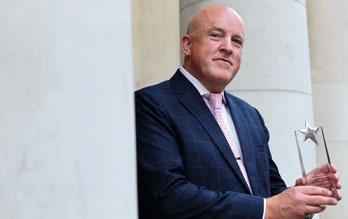
Aubrey McCarthy, who runs moving and storage business AMC Removals, has been named Humanitarian of the Year by the Red Cross, for his work as founder and voluntary chair of charity Tiglin.
Red Cross, Ireland, based in Wicklow, helps people with life-controlling issues, including homelessness and addiction.
McCarthy set up the charity in 2008, as the result of personal experiences that impacted his childhood, with addiction in his family home. Today, it is helping more
than 50 people in supported housing, 45 in rehabilitation, and more than 100 sheltering from war, and is helping feed and clothe more than 500 homeless people each day through its Dublin centre.
Accepting the award, McCarthy said: ‘While I’m honoured to accept this award, I need to remember that the backdrop of this is the plight of homelessness, the separations of war, and the disempowerment of addiction that too many people are facing in Ireland today’.
JK Moving has named Tony Mercer as LongDistance Driver of the Year.
According to the Virginia-based company, Mercer received a US$5,000 bonus for ‘his commitment to providing an outstanding customer experience and a focus on safety, while embracing JK’s core values and brand promise of care and respect’.
Mercer comes from a family of drivers, including his mother, Joyce Shaff, who has her CDL licence, and his sons DJ and Tony Jr, who all work for the business.
David Cox, president of JK Moving, said: ‘Long-distance drivers are crucial to our business success. That’s why every year we honour the very best… Tony has an outstanding safety record and takes excellent care of customers. In addition, he recruited a fantastic, trusted team to help him—his mother and two grown sons. Together, they make the JK experience great for customers, and we are proud to have him and his family on our team.’
In recognition of the vital role of its

drivers, JK Moving increased annual guaranteed income for experienced Overthe-Road Class-A CDL drivers to a minimum of $100,000, twice the national average for the position.
Meanwhile, JK Moving has again been named as a ‘Best Place to Work’ in the greater DC region by the Washington Business Journal. The company was included on a list of the 75 best local employers, coming in the top 10 in a category for extra-large employers.
Doree Bonner’s Group International Director, James Dasey, has celebrated 25 years with the company. He joined the business as International Sales Consultant in 1999.
Jason Herbert, Group Managing Director, said: ‘Over the past 13 years, James has steered our international department to unparalleled success. His strategic vision has firmly established our international services as among the foremost in the UK, especially in the domain of migrant relocation. Serving as president of the FIDI 39 Club, James is a revered figure in our industry.’

Voerman Group’s Chief Commercial Officer, Wiebe van Bockel, has taken on the Alpe d’HuZes cycling challenge, in aid of his colleague Erik Couwenberg, who is ill with cancer.
Wiebe (pictured below, left) said taking part in the challenge – which involves cycling up a mountain in France up to six times during a single day – was in celebration of Erik’s approach to life. ‘Full of energy, glass more than half full, and always looking for an opportunity,’ he said. ‘A true example for all of us. Having gone through cancer in my own family recently, I do know what an impact it has on personal life, as well as on all family members.’
You can donate to the cause via Wiebe’s profile on LinkedIn or via: moredetails.uk/ FF314wiebe

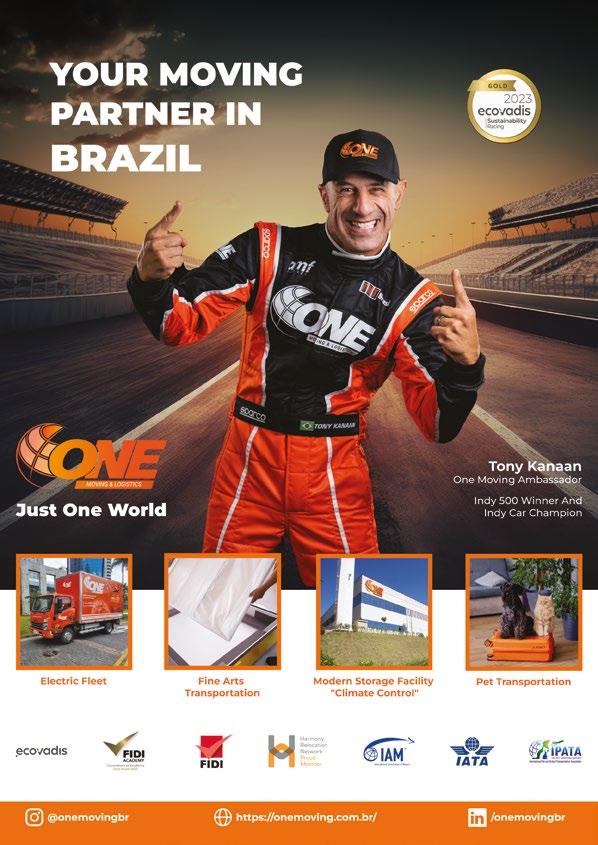

No two moves are alike. They are as unique as the people moving, each with their own reasons, destinations and unique personalities. People move for personal or professional reasons, but here at Gosselin, moving means more than just relocating people and their belongings. We support you throughout the entire process, with care, confidence, and dedication. We cater to your needs and adapt to your world, down to the smallest details.